
WELLREAD Magazine's Best of 2023 Volume One
We Are Living History - T.K. Thorne
Miller’s Cafe - Mike Hilbig
Sleeping On Paul’s Mattress - Brenda Sutton Rose
The Courage of Wayward Girls - Penny Koepsel and Claire Hamner Matturro
Rain Can Be a Melancholy Thing - J. B. Hogan
A Hard Dog - Will Maguire
Evolution of Love - Robb Grindstaff
Ode to the Greatest Generation -James D. Brewer
Silver Sequins - Joy Ross Davis
My Valentine - Carrie Welch
Move Me -Annie McDonnell
Roll-Splash-Roll - Robin Prince Monroe
The Night I Left Psychology - Tom Shachtman
My Passage to India - Suzanne Kamata
Writing as Kintsugi: Celebrating the Beauty of Imperfection -Ashley Holloway
The People - Macy Spevacek
Choices - Robin Prince Monroe
Ornate Beast - Claire Hamner Matturro
Waiting for a Signal - Jeffrey Dale Lofton
Obituaries - Rebecca Klassen
What We Keep, What We Throw Away - Phyllis Gobbell
What She Thinks About When She Thinks About ShoesEllen Notbohm
The Water Hole -Eileen Coe
In the City of Love - Susan Cornford
Ginia - J. B. Hogan
Epiphanic Bliss (Plurality in Motion) - Scott Thomas Outlar
Dismantling a Childhood - Jon Sokol
Mother's Day - Will Maguire
The Party Organiser - Fiorella Ruas
The Bread Grabbers - Jonathan Pett
A Georgia Love Story - Claire Hamner Matturro
In the Silence of the Nighttime - Mike Turner
The Pauper’s Cemetery - Micah Ward
Beast of the Moment - Larry F. Sommers
Chaos - Richard Stimac
Hot Chicken (The Mostly-True Story of How Hot Chicken Came to Be) - Rita Welty Bourke
Sour-Cherry Pastries for Mihaela -Ana Doina
Pain - DeLane Phillips
Author Biographies
Lindsay Carraway -Artist Statement
When you purchase a copy of THE BEST OF 2023 anthologies, you’re not only buying a great collection of prose and poetry and supporting the authors and poets inside the pages - you’re also helping
WELL READ Magazine pay for some of the costs behind publishing a monthly online journal.
Thank you for your support –and HAPPY READING!
In January of 2023, WELL READ Magazine began accepting submissions for prose, poetry, and visual art. I received a wonderful mix of fiction, flash fiction, nonfiction, and poetry along with some amazing artwork. Some of the pieces will make you laugh and some will pull at your heartstrings—there are a few pieces that might make you cry or get your blood boiling. There are no prompts or themes for the submissions so I never know what I’m getting into until I dive in. Every single one is a surprise and a treasure.
BEST OF 2023 VOLUME ONE features submissions from January to June
BEST OF 2023 VOLUME TWO features submissions from July to December They are now available in print and digitalpick up a copy today!
WELL READ MAGAZINE 6

7 JUNE 2024 ISSUE NO. 23 LETTERFROMTHEEDITOR 9 TOADDTOYOURTBRLIST 23 WHYYOUSHOULDADVERTISEINWELLREAD 39 INSIDE VOICES Robert Gwaltney & Jeffrey Dale Lofton introduce Mimi Herman 41 MOUNTAIN MAGIC withAnnHite 53 WELL DONE! PROSE, POETRY, AND ART MR.BROWNREADSbyJ.L.Oakley 63 JAPPALACHIANbyMandyJones 71 WILMAbyPhyllisGobbell 77 AVISITFROMTHEPRINCEOFWALESbySuzanneKamata 87 SPENDINGTHENIGHTONPLANETMARSbyFhenM. 95 CALLFORSUBMISSIONS 99 HELLO READERS!
Tina Mozelle Braziel and James Braziel

WELL READ MAGAZINE 8 CLAIRE CONSIDERS GlassCabin by
101 THE WRITER’S EYE withDeanJames 107 ANNIE ASKS PiperHuguley 111 TripLit withD.Major 119 AUTHORS INTERVIEWING AUTHORS Eliot Parker and Meagan Lucas 125 LAGNIAPPE -OAKLEIGHLITERARYLAWNPARTY 139 NETWORKING 147 WHAT’SYOURSTORY? 155 OFF THE PAGE WITHRAYMONDATKINS 157
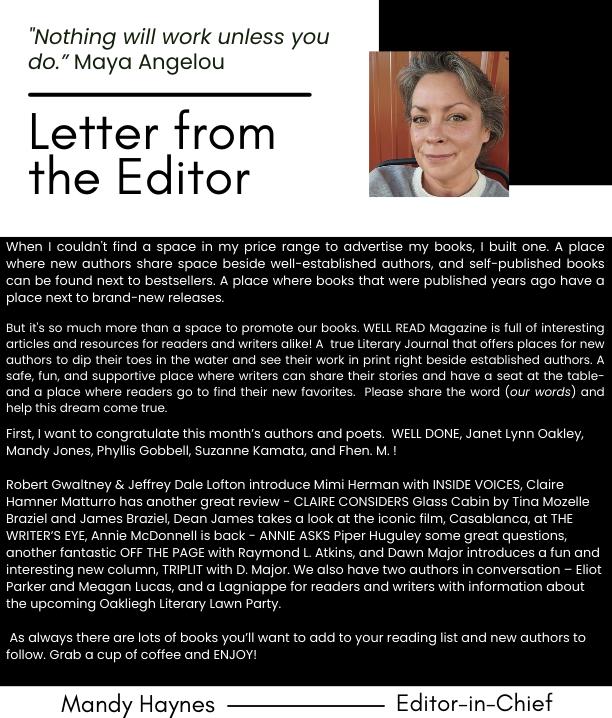
9 JUNE 2024 ISSUE NO. 23 LETTERFROMTHEEDITOR

WELL READ MAGAZINE 10 HELLOREADERS!

11 JUNE 2024 ISSUE NO. 23 GOODNEWSGROUP

WELL READ MAGAZINE 12 SUBSCRIBETOWELLREAD’SNEWYOUTUBECHANNEL!

13 JUNE 2024 ISSUE NO. 23 BETWEENTHEPAGES-INTERVIEWS,READINGS,ANDMORE

WELL READ MAGAZINE 14
MyAunt Helen taught me to crochet and decorate cakes. She always encouraged the creative side of me. Helen would tear out her favorite pictures of jewelry from her Sundance catalogs and save them for me. For inspiration she’d say when she slipped the envelopes in my hand.
One really stressful Thanksgiving day I stopped at her house on the way to my mama’s. Instead of making me feel stupid (or guilty) for the panic attack that had me driving around in circles in East Nashville when I should’ve been driving straight down Gallatin Rd towards Greenbrier, she made me laugh. When she heard my stomach growling, she fed me coconut cake.
She loved to sew and paint and could turn nothing special into something beautiful without batting an eye.
She had a wicked smart sense of humor and was a great storyteller. Helen was not a complainer, she didn’t hold grudges, she never wished bad things on people that deserved them or said a bad word about anybody. But she did agree with me that DJT’s mouth looks like a dog’s butthole.
She was tiny, but she was fierce.
She loved shoes, purses, and long maxi dresses.
And she loved me. Aunt Helen started our phone calls with Tell me something good. And she ended most every call with I love, you hear me. Not a question, an order. You listen to me, Mandy Ann. You are loved.
15 JUNE 2024 ISSUE NO. 23
MyAuntHelenbyMandyHaynes
Helen Frances Bruce slipped out the side door and went onto her next big adventure on May 22nd.
I don’t know about the whole heaven and hell idea – but I do believe that this life is just part of the journey. And I know Helen is no longer in pain, that she’s not afraid, and wherever she is, she’ll be getting into some good trouble soon.

I’m still numb, and I will miss her for the rest of my life, but I will never forget how special she is and how lucky I am to be HB’s niece.
Aunt Helen - all dolled up to bring me one of her chocolate pies after I had surgery. Everything she did, she made it seem like a special event.
WELL READ MAGAZINE 16
MyAuntHelenbyMandyHaynes

17 JUNE 2024 ISSUE NO. 23 MyAuntHelenbyMandyHaynes

WELL READ MAGAZINE 18



19 JUNE 2024 ISSUE NO. 23
WHAT ARE YOU
YOU READING?
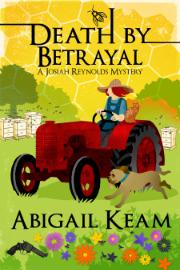
Death By Betrayal:AJosiah Reynolds
Mystery 20 by
Abigail Keam
Betrayal – The act of thwarting a person’s trust, revealing information in violation of confidence, or failing to honor a promise.
Josiah knows all about betrayal. In the glamorous Bluegrass world of oakcured bourbon, antebellum mansions, and Thoroughbred horse farms, betrayals never die—never remain hidden. The dark and bloody land called Kentucky eventually gives up its secrets from its dark, loamy soil, laying them bare for all to see.
The day starts out innocently with Josiah visiting Hunter, her boyfriend, and his new farm assistant, Palley. The young man tells Josiah of his desire to enter the demolition derby at the county fair. Ever since Palley received his driver’s license, he has been waiting to compete, but he needs an old beater of a car to enter.
Josiah tells Palley he is welcome to use an old jalopy that’s been gathering dust in an unused barn on her property. Josiah and an excited Palley travel to her shed. Pulling off an old tarp, they examine the car until they find—you guessed it—a body in the back.
Whose body is it? How did it get there? Josiah is on the trail of murder again. In the mysterious Bluegrass, there’s justice, and then there is Josiah’s justice!
WELL READ MAGAZINE 22
WHATAREYOUREADING?
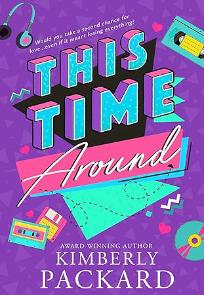
This TimeAround by Kimberly Packard
Most of us would jump at a chance for a do-over of our teenage years.. .but what if our worst mistakes lead to our happily-ever-after?
Josie Gardner’s life revolves around her amazing children and her career. But, when her husband threatens to take her kids in their divorce, and the business she’s put most of her passion, time and money into building is at risk of failing, a panic attack shatters her grip on reality… and the present.
Josie wakes up in her teenage bedroom, thirty years in the past. She’s forced to relive her emotionally devastating senior year of high school — the year she cut her father out of her life, caused one of her best friends to sever ties, and turned away the boy she loved.
Determined to get back to her children in her own time, Josie tries to fix the mistakes she made, in the hope that righting wrongs will send her back to the present. But when tempted by her high school crush Josie faces the real possibility of losing her future for good.
Would you take a second chance for love…even if it meant losing everything?
23 JUNE 2024 ISSUE NO. 23
TOADDTOYOURTBRLIST
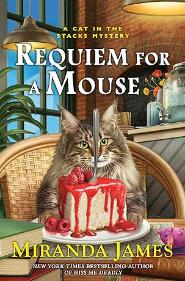
Requiem for a Mouse (Cat in the Stacks Mystery Book 16)
by Miranda James
Librarian Charlie Harris and his everintuitive feline friend Diesel must catch a killer in a deadly game of cat and mouse where no one is who they seem to be...
At last, Charlie and Helen Louise’s wedding is only a month away. They’re busy preparing for the big day, and the last thing Charlie needs is a new mystery to solve. Enter Tara Martin, a shy, peculiar woman who has recently started working part-time at Helen Louise’s bistro and helping Charlie in the archive. Tara isn’t exactly friendly and she has an angry outburst at the library that leaves Charlie baffled.And then she abruptly leaves a catered housewarming party Charlie’s son Sean is throwing to celebrate his new home in the middle of her work shift. Before ducking out of the party, Tara looked terrified and Charlie wonders if she’s deliberately trying to escape notice. Is she hiding from someone?
When Tara is viciously attacked and lands in the hospital, Charlie knows his instincts were correct: Tara was in trouble and someone was after her. With the help of his much beloved cat, Diesel, Charlie digs deeper, and discovers shocking glimpses into Tara’s past that they could never have predicted. Will they catch the villain before Charlie’s own happily ever after with Helen Louise is ruined?
WELL READ MAGAZINE 24
WHATAREYOUREADING?

THE CICADATREE by
Robert Gwaltney
“This book has EVERYTHING a reader could want in a southern fiction genre book....it blew my mind! I have anticipated reading this novel for awhile and it was so worth the read. It's so hard to write any words that begin to express what an experience it was to read Analiese's story. This is a masterpiece in written words.
Mr. Gwaltney begins the complicated, emotionally charged, and obsessively fascinating story of Analeise Newell with his magnificent strokes of southern gothic storytelling that captivated me from page one all the way to the dramatic end. He creates pages of dialogue, descriptions and elements of character that I couldn't stop "looking" at....just as Analiese couldn't resist or help herself when it came to the Mayfields. The pages come to life with Mr. Gwaltney's perfection in vivid images, richness and his ability to create a connection to the characters in everything they felt, saw, heard and experienced. Especially through Analiese's point-of-view. Amazing!” Five Star Reader Review
25 JUNE 2024 ISSUE NO. 23
TOADDTOYOURTBRLIST
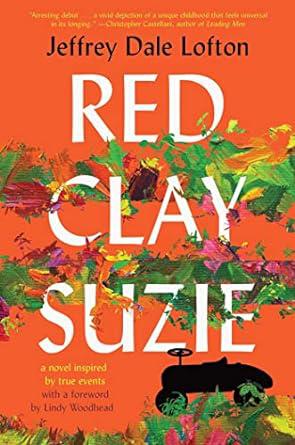
Red Clay Suzie by Jeffrey Dale Lofton
Longlisted for the Center for Fiction 2023 First Novel Prize
Anovel inspired by true events
The coming-of-age story of Philbet, a gay, physicallymisshapen boy in rural Georgia, who battles bullying, ignorance, and disdain as he makes his way in life as an outsider— before finding acceptance in unlikely places.
“This is a great book of which I found so many relatable stories. At times it was as if I was reading about my own life growing up gay in the deep south. It made me laugh out loud a few time and cry a few times too. Anyone wanting to understand how it was growing up in that environment in that time period should read this book. It will give you a different perspective on surviving and thriving in a prejudice world.” Five Star Reader Review
WELL READ MAGAZINE 26
WHATAREYOUREADING?

The Smuggler's Daughter by
Claire Matturro
"This no-holds-barred, tellFlorida-like-it-is tale is as rich as buttery lobster. Brilliantly drawn characters, totally believable dialogue, suspense until the very end..." Southern Literary Review's September Read of the Month
"... a tightly-paced thriller with authentic and engaging characters that the reader will find it hard to say goodbye to. Reminiscent of the work of novelists like Carl Hiaasen and Tim Dorsey, it's a can't miss for fans of old Florida noir..." Dennis Maley, The Bradenton Times
"Though I've long been a fan of Claire Matturro, her latest blew me away. Her lyrical depictions of the Gulf Coast landscape, the densely layered story where the intertwining of past and present creates a resonance that only our best novelists achieve, the narrative that is at once, scary, gripping, moving, and populated by unforgettable characters, combine to make Smuggler's Daughter as good a novel as I've read in years." ~ James W. Hall, Edgar and Shamus winning author.
27 JUNE 2024 ISSUE NO. 23
TOADDTOYOURTBRLIST

Haints on Black Mountain:A Haunted Short Story Collection byAnn Hite
Ann Hite takes her readers back to Black Mountain with this haunted short story collection. An array of new characters on the mountain experience ghostly encounters. The collection took inspiration from her beloved readers, who provided writing prompts. Wrinkle in the Air features Black Mountain's Polly Murphy, a young Cherokee woman, who sees her future in the well's water. Readers encounter relatives of Polly Murphy as the stories move through time. The Root Cellar introduces Polly's great grandson, who tends to be a little too frugal with his money until a tornado and Polly's spirit pays the mountain a visit. In The Beginning, the Middle, and the End, readers meet Gifted Lark on an excessively frigid January day.This story moves back and forth between 1942 and 1986 telling Gifted and her grandmotherAnna's story.This telling introduces spirits that intervene in the spookiest of ways.
“A Short Story Compilation that reads like a novel - Loved it. Haints and human characters alike.” Five Star Reader Review
WELL READ MAGAZINE 28
WHATAREYOUREADING?

The Bystanders by Dawn Major
“Without a doubt, Dawn Major is thoroughly schooled in the full-blown existence of jealousy, lust, love, confusion, pettiness, mystery, violence, hope, et al, exhibited by small-town denizens. The Bystanders stands tall in the world of coming-of-age novels”
George Singleton, author of You Want More: Selected Stories
“Dawn Major has written a gritty and hard-hitting novel about a couple of teenagers trapped in poverty, violence, and addiction. This colorful novel is set in the small real town of Lawrenceton, Missouri, whose dark side Major exposes in prose that is vivid and sensate. In the end, thankfully, Major shows that even a tragic world offers a way out. Major is a writer to watch.”—Janisse Ray, author of The Woods of Fannin County and Ecology of a Cracker Childhood
29 JUNE 2024 ISSUE NO. 23
TOADDTOYOURTBRLIST

TheyAll Rest in the Boneyard Now by Raymond LAtkins
With
illustrations by
Evelyn J. Mayton
“Raymond Atkins writes with intuitive wisdom, as he channels those from beyond the grave. His poetry gives voice to those who once mattered, those who time wants us to forget. In They All Rest in the Boneyard Now, Atkins wrestles death from the dusty clay and breathes life into dry bones while reminding us that every soul who once had breath is worthy of being remembered. These saints, sinners, socialites, and the socially inept are all victims of time, or circumstance, as we too shall one day be. Atkins offers salvation to all who are tormented, and solace to those who seek eternal rest.” – Renea Winchester, Awardwinning author of Outbound Train
WELL READ MAGAZINE 30
WHATAREYOUREADING?
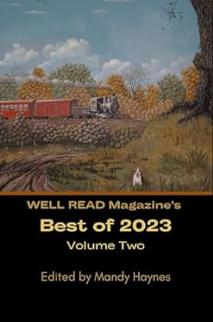
WELL READ Magazine's Best of 2023 Volume Two edited by
Mandy Haynes
Contributors:
Ann Hite, Malcolm Glass, Dawn Major, John M. Williams, Mandy Haynes, Francine Rodriguez, Mike Turner, Mickey Dubrow, William Walsh, Robb Grindstaff, Deborah ZenhaAdams, Mark Braught, B.A. Brittingham, Ramey Channell, Eileen Coe, Marion Cohen, Lorraine Cregar, John Grey, J. B. Hogan, Yana Kane, Philip Kobylarz, Diane Lefer, Will Maguire, David Malone,Ashley Tunnell, Tania Nyman, Jacob Parker, LaVern Spencer McCarthy, K. G. Munro,Angela Patera, Micheal Spake, George Pallas, Marisa Keller, Ken Gosse, and Orlando DeVito
You’ll find forty-three submissions written by a fantastic mix of award-winning authors and poets plus new ones to the scene. Three submissions in this volume were nominated for a Pushcart Prize:ABleeding Heart byAnn Hite,AFew Hours in the Life of a Five-Year-Old Pool Player by Francine Rodriguez, and There Were Red Flags by Mike Turner. The cover art for Volume Two is by artist, DeWitt Lobrano, who had several pieces published in November’s issue. Enjoy!
31 JUNE 2024 ISSUE NO. 23
TOADDTOYOURTBRLIST

The Best of the Shortest: ASouthern Writers
Reading Reunion by Suzanne Hudson (Author, Editor), Mandy Haynes (Editor), Joe Formichella (Editor)
Contributors:
Marlin Barton + Rick Bragg + Sonny Brewer + Doug Crandell + Pia Z. Ehrhardt + David Wright Faladé + Beth Ann Fennelly + Joe Formichella + Patricia Foster + Tom Franklin + Robert Gatewood +
Jason Headley + Jim Gilbert + Frank Turner Hollon + Suzanne Hudson + Joshilyn Jackson + Bret Anthony
Johnston + Abbott Kahler + Doug Kelley + Cassandra King + Suzanne Kingsbury + Dawn Major + Bev
Marshall + Michael Morris + Janet Nodar + Jennifer
Paddock + Theodore Pitsios + Lynn Pruett + Ron Rash + Michelle Richmond + R. P. Safire + Dayne Sherman + George Singleton + Robert St. John + Sidney Thompson + Daniel Wallace + Daren Wang + James Whorton, Jr. + Mac Walcott + Karen Spears Zacharias
WELL READ MAGAZINE 32
WHATAREYOUREADING?

“I love story collections because of the variety of voices and visions. Because each story is very short, the book is like a treasure chest, so many jewels, so rich with reflection and value. Wonderfully curated.”
FIVE STAR READER REVIEW
Suzanne Hudson is the author of two literary novels, In a Temple of Trees and In the Dark of the Moon. Her short fiction has been anthologized in almost a dozen books, including Stories from the Blue Moon Café and The Shoe Burnin': Stories of Southern Soul. Her short story collection Opposable Thumbs was a finalist for a John Gardner Fiction BookAward. Her short stories, All the Way to Memphis, brings characters from the South to life in a way any reader will know and love. She lives with her husband, author Joe Formichella, near Fairhope,Alabama.
33 JUNE 2024 ISSUE NO. 23
TOADDTOYOURTBRLIST


WELL READ MAGAZINE 34
This is a great way to support a fellow author or an author you follow.
To take advantage of the ½ OFF special use the order forms below:
35 JUNE 2024 ISSUE NO. 23
FULL
IN THE TBR SECTION WELLREAD COVERS
PAGEADS

Walking The Wrong Way Home by
Mandy Haynes

Spanning nearly twenty decades, the struggles and victories these characters face are timeless as they all work towards the same goal.
Aplace to feel safe, a place to call home.
Sharp as a Serpent's Tooth: Eva and other stories by Mandy Haynes
Each story features a female protagonist, ranging from ten to ninety-five years of age. Set in the south, you’ll follow these young women and girls as they learn that they’re stronger than they ever thought possible.
WELL READ MAGAZINE 36 WHATAREYOUREADING?
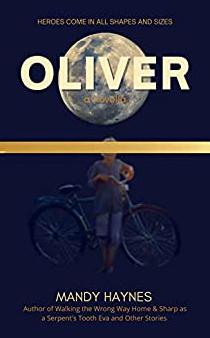 Oliver by Mandy Haynes
Oliver by Mandy Haynes
“Dear God…and Jesus and Mary…”
Even though eleven-year old Olivia is raised Southern Baptist, she likes to cover her bases when asking for a favor. Unlike her brother Oliver, she struggles with keeping her temper in check and staying out of trouble. But Oliver is different, and in the summer of ’72 he proves to Olivia there’s magic in everything - it’s up to us to see it.
Mandy Haynes spent hours on barstools and riding in vans listening to great stories from some of the best songwriters and storytellers in Nashville, Tennessee. After her son graduated college, she traded a stressful life as a pediatric cardiac sonographer for a happy one and now spends her time writing and enjoying life as much as she can. She lives in Semmes, Alabama with her three dogs, one turtle, and helps take care of several more animals at Good Fortune Farm Refuge. She is a contributing writer for Amelia Islander Magazine, Amelia Weddings, author of two short story collections, Walking the Wrong Way Home, Sharp as a Serpent's Tooth Eva and Other Stories, and a novella, Oliver. She is also the editor of the anthology, Work in Progress, and co-editor of the Southern Writers Reading reunion anthology, The Best of the Shortest. Mandy is also the editor-in-chief of WELL READ Magazine, an online literary journal created to give authors affordable advertising options that supports and promotes authors of all genres and writing backgrounds. Like the characters in some of her stories, she never misses a chance to jump in a creek to catch crawdads, stand up for the underdog, or the opportunity to make someone laugh.
37 JUNE 2024 ISSUE NO. 23 TOADDTOYOURTBRLIST

When you purchase an “ad”, you get a full page slot in WELL READ’s What Are You Reading? section with a live link to your website and a live purchase link of your choice.
Readers asked for full page, easy to read, “book recommendations” in place of traditional looking advertisements and I was happy to oblige.
As a bonus, there are personalized individual graphics made of your book image and author
WELL READ MAGAZINE 38
WHYYOUSHOULDADVERTISEINWELLREAD
photo (if you choose to purchase a two page spread or more) with your book description and/or blurbs, bio, etc., shared to eight additional FB bookish accounts and to WELL READ Magazine’s Instagram, Pinterest, and Facebook sites – (that’s 50K in potential views of your book when you combine all the sites).
WELL READ is distributed through ISSUU (the world’s largest digital publishing and discovery platform available). WELL READ Magazine receives an average of 8,000 views each month from readers all over the world.
Past issues are available and easily discovered on Issuu’s site. *All PAST issues, including the article and visual stories, remain active and are linked to the current issue. You can continue to share them for as long as you like.
There is strength in numbers. Your “ad” will be included with the featured authors, great interviews, submissions, and the other fantastic books readers look for to add to their reading lists.
39 JUNE 2024 ISSUE NO. 23
WHYYOUSHOULDADVERTISEINWELLREAD
INSIDE VOICES

When I’m describing kudzu to people who have never heard of it, I say, “Think of ivy that wants to eat you.”
Robert Gwaltney and Jeffrey Dale Lofton introduce Mimi Herman
40 WELL READ MAGAZINE
Mimi Herman is a Kennedy Center teaching artist and codirector of Writeaways writing workshops in France, Italy, Ireland, and New Mexico. She serves as vice-chair of the Board of Directors for theAssociation ofWriters &Writing Programs, and has taught in the Masters of Education programs at Lesley University, served as the North Carolina Piedmont Laureate and been an associate editor for Teaching Artist Journal. Since 1990, she has engaged over 25,000 students and teachers with her warm and intuitive teaching style.
Her novel, The Kudzu Queen, was selected by the North Carolina Center for the Book for the 2023 Library of Congress “Great Reads from Great Places” and has been longlisted for the Center for Fiction First Novel Prize and shortlisted for the VCU Cabell First NovelistAward.
Jeffrey: Where did you find Mattie and her story?
Well, one day in 1994–a very long time ago–I was in one of my favorite places, the downtown Durham, North Carolina Public Library, scrolling through the microfiche. For those of you too young to remember microfiche, imagine a big machine that’s basically a magnifying glass for tiny little photos of printed materials–books, magazines and newspapers. Don’t ask me what I was doing on microfiche. I had no idea. Usually I went straight to the fiction section and checked out as many books as I could carry.
Anyhow, I came across this article on men who made it
INSIDEVOICES 41 JUNE 2024 ISSUE NO. 23
Robert Gwaltney & Jeffrey Dale Lofton
their life’s work to promote kudzu. They traveled from town to town, promoting kudzu: trying to get farmers to plant it, holding kudzu festivals, and having Kudzu Queen beauty pageants.As you probably know, in the south there’s a queen for everything. Can you imagine being the Okra Queen? But I thought it was the strangest thing I’d ever heard of. I grew up riding in the car to the beach with my family, surrounded by kudzu, and couldn’t imagine why anyone would want to plant the stuff, much less be the queen of it. When I can’t figure out why something’s true, I write fiction to come up with an answer.
The other piece of this book, and the genesis for Mattie, is this quality I’ve often observed in girls of about fourteen or fifteen, where they’re trying on their sexuality for size, to see how it fits. Sometimes, maybe even often, this can get them into a situation that’s more challenging than they’d anticipated, which is what happened with Mattie.
Robert: Lush and pillowy, kudzu covered everything in sight in my small hometown of Cairo Georgia. For the uninitiated, what exactly is kudzu, and what redeeming qualities, if any, does it have?
Kudzu is an invasive vine imported into the US for the 1876 World’s Fair in Philadelphia.When I’m describing kudzu to people who have never heard of it, I say, “Think of ivy that wants to eat you.” It’ll take over trees, telephone poles and even houses, and bring them to the ground. I call it “southern topiary” and recommend that farmers not leave
WELL READ MAGAZINE 42
introduce Mimi Herman
Robert Gwaltney & Jeffrey Dale Lofton introduce Mimi Herman
their tractors or their cows in the field overnight.
For a while after the World’s Fair, kudzu was sold by a nursery as an ornamental plant. It is in fact, a highly ornamental plant, and very well thought of in Japan. In the 1930s, the US government came up with the bright idea to promote it. The Department of Agriculture not only produced pamphlets on the proper propagation of kudzu, which is hard to imagine for anyone who’s grown up in the south, but also paid farmers to plant it. And the Civilian Conservation Corps, the CCC, paid young men to plant it along railway embankments to prevent erosion.
In this country we’re great at importing a plant or animal to solve a problem, but we forget to bring along the rest of its food chain with it. But think about it: we’d just gotten through the Great Depression and the Dustbowl. And here was a plant that would grow 12 inches in a day and had all sorts of uses, which Mr. James T. Cullowee, the Kudzu King in my novel, promotes: you can feed your livestock, make flour out of the roots or jelly out of the flowers. It’s a headache and alcoholism cure. I don’t know if you can make cigarettes out of it–I made that part up–but I wouldn’t be surprised.
Jeffrey: In The Kudzu Queen, you’ve created a 1940s charismatic shyster. It seems like there has been a resurgence in them over the last several years. How is this story from 80 years ago a comment on today, and what makes Mr. Cullowee timeless?
43 JUNE 2024 ISSUE NO. 23
Robert Gwaltney & Jeffrey Dale Lofton introduce Mimi Herman
Can we ever get enough of con artists? I sometimes wonder if there’s something hardwired into our species that makes us tend to look for quick and easy solutions to hard problems: get rich quick, answer these questions and we’ll match you with the person of your dreams, get AI to write your novel and you’ll sell a million copies.
And then there’s the whole reality show phenomenon: anyone can be famous just for being famous–or is that a tautology? I had my doubts about reality shows when they first started, and since then my concerns have only deepened. I won’t mention politics, but…
Robert: I’m fascinated by this concept of rings (as in the rings of a tree) of life inside of us, especially because Mattie is underage, and the Kudzu King is older. Talk to us a bit about how rings of life exist in us and your idea that no matter our chronological age, some version of our younger selves remains alive and present?
As long as I can remember, I’ve had this idea that people are like trees, and we have rings inside us for all the years we’ve lived. So in each of us, there’s a two-year-old, a tenyear-old, a fifteen-year-old, and so on. In trees, when the weather is warm and wet, the rings are wide, while in cold, dry years they’re narrow. Like trees, we often have years rich with growth. For me, one of those years was when I was fifteen, which helped me understand Mattie so I could write from her point of view. And maybe you can take this further. Perhaps the widest rings, the years of most growth,
WELL READ MAGAZINE 44
Robert Gwaltney & Jeffrey Dale Lofton introduce Mimi Herman
are the ages to which we revert in intense situations. For me, it’s fifteen. For others, it may be the terrible twos.
Jeffrey: Aunt Mary and her abandoned house—what was behind the impulse to create this other world where Mattie alone goes to escape?
It’s funny, when I write, I don’t think: Now I should create this setting or this character. It’s almost like a movie where I see these things appearing on the horizon as I approach them. I have years of training as a writer; a BAin literature, psychology and creative writing; an MFA in fiction; and many years spent teaching writing, but I sometimes feel like my subconscious is running the show.
So I don’t remember planning Aunt Mary’s house, but Mattie and her brother needed a place to plant kudzu, and what better place than a house that belongs to their family, where no one visits?And why doesn’t anyone visit it?Well, they’re waiting for Aunt Mary’s meanness to wear off. For those of you who have never created a mean character, I recommend it. It’s a lot of fun. But I have a hard time thinking badly of anyone for too long, so it turns out Aunt Mary may have some redeeming qualities.
The other reason Aunt Mary’s house is important is that it gives Mattie a place to get away so she can do some serious thinking and growing up–though she ends up getting more growing up than she plans for.
45 JUNE 2024 ISSUE NO. 23
Robert Gwaltney & Jeffrey Dale Lofton introduce Mimi Herman
Robert: I don’t want to give anything away, but…how do you decide if guilty players are punished or, at the least, pay for their wrongs or get away with them unscathed?
The word “decide” makes it sound like it was entirely intentional, but I write for the same reason I read: to find out what’s going to happen next. For me, bad behavior can be complex, and punishments don’t always solve the problem. I wanted there to be enough of a punishment that you wouldn’t feel like someone had gotten away with something they shouldn’t, but not anything so absolutely conclusive that you’d close the book and forget about it.
When I teach writing, I tell my students that an ending needs to be only two things: absolutely surprising and absolutely right. So the punishment needed to be something the reader wasn’t expecting, and yet feel just right for the rest of the book.
Jeffrey: The Kudzu Queen has received a great deal of critical praise, the latest being shortlisted for the VCU Cabell Prize. What has the reception from readers, reviewers, and awards programs meant to you?
In the past year and a half my life has been transformed. I’ve written and published for years–poems, short stories, poetry collections, a nonfiction book. But there’s something about this book–the way people have made it part of their lives, fallen in love with the characters and become their champions–that is magical to me. I think of writing as a gift
WELL READ MAGAZINE 46
Robert Gwaltney & Jeffrey Dale Lofton introduce Mimi Herman
I give to readers, hoping it will be of some use in their lives, even if it’s just a place to lose themselves in another world for a while. But I never expected this book to make so many friends. I am floored with gratitude for the kindnesses everyone has given to The Kudzu Queen and to me.
Robert: You and your partner in life, John Yewell, are writers as well as teachers. Will you talk about the exotic destinations to which you travel and what your writing workshops entail?
Okay, imagine if someone said to you, “You can go anywhere in the world for a week at a time. And while you’re at it, why not bring a bunch of great writers with you and build a community, eat fabulous local food and drink wine and cocktails and talk about writing from the time you get up until the time you fall asleep?”
You’d say, “Twist my arm!” right?
Over the past twelve plus years, John and I have offered these Writeaways workshop retreats in a chateau in France, villas in Italy, gorgeous adobes in New Mexico and a manor house in Ireland. It’s one of the best things I get to do, and it makes me so happy to see how people–from brand new writers to authors who have published many books–grow in their writing craft and build communities that last well beyond our week together. Many of our Writeaways participants come back to the same place year after year–France and Italy are especially popular–while others try
47 JUNE 2024 ISSUE NO. 23
Robert Gwaltney & Jeffrey Dale Lofton introduce Mimi Herman
them all.
Jeffrey: Regal House, your publisher, has been in the news quite a bit lately, which included a feature in Publishers Weekly. Tell us about that.
What an amazing press! Regal House just celebrated its 10th anniversary, and invited Regal authors to spend a weekend together. People came from all over the country for three days of readings, panel discussions, a cocktail party and the chance to get to know other Regalites we’d only met through social media.
Regal House, the brainchild of Jaynie Royal and run by Jaynie and her fabulous partner, managing editor Pam Van Dyk, is becoming widely known as a small press of distinction and integrity. In addition to publishing great books, they have a podcast,AConspiracy of Lemurs, and a culture that encourages their writers to support one another as well as our local bookstores and educational community.
Robert: Describe for us the experience of being part of the vibrant North Carolina writing community.
I’m sure other states are wonderful, but I see the North Carolina writing community as particularly supportive. We have a long history of great writers, and generosity toward one another, as well as wonderful institutions such at the North Carolina Writers’ Network, which provides several writers’ conferences a year, the UNC-Chapel Hill
WELL READ MAGAZINE 48
Robert Gwaltney & Jeffrey Dale Lofton introduce Mimi Herman
undergraduate writing program and the Warren Wilson MFA program for writers (both of which I attended and loved), the Weymouth Center for writing retreats, the Great Smokies Writing Program at UNC-Asheville, the MFA programs of Queens College and NC State, and many other writing programs and organizations large and small. I feel lucky beyond belief to be from a state where writers share what they’ve learned with other writers and celebrate each others’successes.
Robert: What’s next for you?
I’m hard at work these days on my next book, set in Ireland in the mid-1980s, which features a missing grandchild of a member of the IRA, a burger joint called CaptainAmerica’s and a drag queen named Holly Unlikely. I can’t wait to find out what’s going to happen!
49 JUNE 2024 ISSUE NO. 23


WELL READ MAGAZINE 50
"Funny, sad, and tender... Mimi Herman has written a novel that possesses a true and hard won understanding of the South." —David Sedaris
The Kudzu Queen Mimi Herman
51 JUNE 2024 ISSUE NO. 23

52 WELL READ MAGAZINE MOUNTAIN MAGIC with ANN HITE Seeing A Haint
In my novels, I always have a haint—some people don’t know that is a word we use in Appalachia instead of ghost. When I begin a book, I don’t plan on a haint to be part of the story, but they always show up. See I’m a pantser, meaning I never know what I’m going to write until I sit down from one day to the next. One question always asked of me when I do a reading or appear on a panel is: “Have you ever seen a ghost?” I hate this question because it’s never as easy as seeing something. No, there is so much more to experiencing a haint. ***
In 1970, Mother decided after five years of living with my granny that she wanted to get us our own place. We had to take a one-bedroom apartment because no two-bedrooms were available.
At twelve, going on thirteen, the last thing I wanted was to sleep in the room with my mother and younger brother. But Mother convinced me to go along with it by telling me about the pool and all the teenagers that lived in the complex.
One week before we moved in, Mother came in from work smiling. Since dad had divorced us, she rarely smiled. “Guess what? We have a two bedroom.”
MOUNTAINMAGICwithAnnHite 53 JUNE 2024 ISSUE NO. 23
This was the best news I had heard.
“You will only have to share with each other.”
We moved the next week. Mother gave us the larger bedroom, and we staked our claim.
My brother, Jeff, opened the door to the empty closet. “Look at this.” He held up a plastic baby bottle and two bibs that he found on the floor.
I shrugged, “Put them up on the top shelf for now. Maybe the other family before us will come back for them.”
He pitched them to the corner of the shelf and put his Lego boxes on the floor.
I noticed the light switch plate for the first time, a lamb with a bow around its neck. “This must have been a baby’s room.” I flipped the switch off.
I settled into a routine and didn’t give a thought to the family who had lived there before us. The light switch plate remained intact and as far as I knew, the bottle and bibs stayed in the closet, pushed to the back of the shelf. I made friends in the apartment complex and as soon as the pool opened for summer, I was there, dragging my dumb brother behind me. Jeff wouldn’t sleep in our room. He claimed there were weird sounds in the bedroom. Mother would find him on the sofa in the living room each morning.
More than two years passed, and I was fourteen with friends that I hung out with. My weekends were full of sleepovers, parties, and skating at the roller rink not far
WELL READ MAGAZINE 54
MOUNTAINMAGICwithANNHITE
from the apartment. One night when I got dropped off at home, Mother, who normally went to bed, was waiting with the lights on. I was early, way before my eleven o’clock curfew. I let myself in the back door.
Mother sat in her red leather recliner with the TV playing. “Ann, some of your friends are playing tricks on me.”
Now, my friends were terrified of my mother. She was known as the strictest mother in the complex. I always went to my friends’ houses. No one ever wanted to come to my house.
“I don’t think they would. They’re all scared to death of you.” I tried to make an escape to my room.
“Wait right there, young lady.” Mother ordered. “I know what happened to me, and I’m not crazy. Those friends of yours have gone too far.”
“What did they do?” There was no use arguing with her.
“They stomped up the front stairs, making all kinds of racket. Then, they twisted the door knob and shook the door.”
“When I asked who was there, they stomped down the stairs. If I find out who did this, I am calling the police on them.”
The front stairs were accessible through a screen door. The hallway would cause quite an echo when someone used this entrance. There was a one-bedroom apartment
JUNE 2024 ISSUE NO. 23
SEEINGAHAINT
across the hall but no one lived there.
When the same thing happened the next weekend, Mother got angry at me again. Mother threatened to make me stay home every weekend. I questioned all my friends. No one would admit to scaring my mother. The next weekend I was stuck at home on a Saturday night. Maybe it was just meant for me to be there.
Jeff was staying over with a friend. Mother and I were watching TV. It was still daylight. The screen door on the front hall squeaked open. Mother looked over at me with her “I told you so,” stare.
I opened my mouth to say something smart, but the most horrible unearthly stomping began moving up the stairs. The walls vibrated and I was sure our neighbor downstairs would come out. When the stomping reached the landing, someone twisted the knob and shook the door. Mother gave me a look of terror.And honestly, I wasn’t sure what scared me worse, the noise or Mother being afraid. The stomping moved back down the stairs.Anger erupted inside my chest and I jumped to my feet, running to our big picture glass window. If I stood and looked straight down I would be able to see who came out the screen door.
“Get away from the window,Ann.” Mother ordered. I held my ground, face mashed against the window. The screen door swung open. I prepared myself to see one of my friends. No one came out the door. The space
WELL READ MAGAZINE 56
MOUNTAINMAGICwithANNHITE
remained empty. The door swung shut.
“Did you see who was there?”
“No one.”
“Don’t try to hide who it was.” Mother fussed.
“I promise I’m not.”
Within two months, Mother moved us to an apartment on the ground level. I think she always thought I was protecting my friends, even after I found out what really happened.
Fast forward ten years. I am twenty-four-years old, married, with a house in the suburbs. I am sitting in the living room of our old neighbor. We kept in touch over the years. This visit she brought up something strange.
“Did you guys ever have any experiences when you lived in your old apartment upstairs?’
For a minute I couldn’t remember. Kids file things away when they have no answers. But the whole scene slid through my mind.
“What kind of experiences?”
Ashy smile formed on her face. “Don’t think I’m crazy.” She went on to describe the stomping on the stairs that Mother and I had heard. “There was a woman, who lived alone in your old apartment upstairs.” She looked at me for
JUNE 2024 ISSUE NO. 23
***
SEEINGAHAINT
a minute before continuing. “When the stomping ended and the screen door slammed, I peeked out the door. No one was there so I went up to check on the woman. She answered the door with a gun in her hand. She explained that a person had twisted her doorknob and shook the door. But the crazy thing she said was this had been happening for weeks. Always the same time of day. Soon after she broke her lease and moved.”
I admitted to the same thing happening to Mother and that one time I experienced it. That’s when she told me the story, she promised my mom not to tell Jeff and me when we were kids.
“Your mom didn’t want you to know how she got the two-bedroom apartment. The weekend before you guys were going to move, the young couple upstairs—they had a little girl not quite one-year old—got into a terrible accident. The husband turned their VW Bug in front of an eighteen-wheeler. The little girl and the mother were killed. He was taken to the hospital with life-threatening injuries. I never found out what happened to him. That is how you guys got a two-bedroom apartment.”
The hairs on my arms stood on end. The next day I told Granny about the story.
“You still had things of that baby in your room. That haint got stirred up. Wanted inside. Wanted its life back. It was confused. Probably real mad too. I told your mama not
WELL READ MAGAZINE 58
MOUNTAINMAGICwithANNHITE
to move in that place. That something would come of it, but she never listened to me anyway.”
“Why did the haint wait two years to bother us?”
“Lord child it didn’t. Your brother wouldn’t stay in the room. Must have been something to that. Your mama was complaining about somebody being in the hall each evening from the time she moved you guys in. It just took you two years to notice something going on. Haints like to mess with you like that. All this one needed was someone to tell it what happened.”
The apartment complex still stands today. I sure hope the haint found peace by now.

59 JUNE 2024 ISSUE NO. 23
SEEINGAHAINT



WELL READ MAGAZINE 62 WELLDONE!Essays,Memoirs,andTrueStories
Mr. Brown Reads
Janet Lynn Oakley
In my life, I have had wonderful teachers: Mr. Walker and Miss Rizzo who flamed my love of history and Miss Love who taught me to write, but scary, raucously funny Mr. Brown tested my courage and inspired my imagination. Sixth grade was the last stop at my elementary school and literally sky high as the classroom was on the top floor across from fifth grade. It was like being crowned. On the first day of school, all my chums and I gathered on the post World War II era playground all a-buzz about our sixth grade teacher. It would be the first time in our elementary career to have a male teacher. Everyone was apprehensive. Would he be like Mrs. Michaels, a replica of Mamie Eisenhower with a not so sweet tongue? Or Mrs. Bates who rapped my fingers in fourth grade with a ruler for some infraction long forgot, but still a loving teacher with cheerful smile? As we approached the last flight of stairs ensemble, our questions were answered. No.
“Morning pupils,” he said in a deep voice as we came
63 JUNE 2024 ISSUE NO. 23
MR.BROWNREADSbyJ.L.Oakley
one by one into the classroom.
Mr. Brown wore glasses and had a face that looked like it still needed to grow up. His dark, short hair rebelled against the combed-down-and parted-to-the-side style of the day, rising up like some wave in the middle. He stood over six feet and like my father towered over us. His broad shoulders were flat as anvils and tested the padding in his suit. Mr. Brown was someone with whom to be reckoned.
Already shy and intimidated by him, I looked for a desk to sit at. I chose the back. Now I only had to find out his teaching style. I put my supplies into the lift top desk and settled down at my seat, smoothing down my skirt as I did so. I kept my head down looking at my new penny loafers.
From the back of the classroom in the cloakroom there was a squeal from one of the girls, and after a shadow whipped behind me, a clatter. A silence as profound as one after a nuclear attack pervaded the room. Mr. Brown came out followed by the class bully looking limp. I found out later that the boy had teased one of the girls, taken her supplies, but upon leaving the space, Mr. Brown had judo flipped him. Or so we believed, but for the first time in six years, that student behaved and never acted up again.
Of course, it was a different time. The boy would have been in special Ed today, but it was the first clue to Mr. Brown’s teaching style. He took no guff. But he had, I soon found out, a soft spot too and genuine desire to connect with
WELL READ MAGAZINE 64
WELLDONE!Essays,Memoirs,andTrueStories
kids. He was funny and creative in his way of teaching math and English. He encouraged storytelling and played a mean game of dodgeball. And Mr. Brown loved baseball. He often rolled the television into the room on Fridays when all our work was done, especially when the Pirates were doing so well. He told jokes and stories and when it was time for our class to go to a week-long camp, he set up cots in the cafeteria and taught us how to make a bed military style.
First you lay the bottom sheet on the mattress and put the tops and bottoms under. Bring up the corners and fold back like a triangle before tucking them under the sides. Repeat with the top sheet at the bottom. Lay the blanket on the same way, fold back the top sheet, tuck, and you’re done, but only if you can make a quarter bounce on it. I still make my bed this way, yet we often wondered how he knew how to do that. By chance, we learned Mr. Brown had served in the military.
One day he came to school upset. There had been a terrible accident at a military base. There had been a demonstration of parachuting for either President Eisenhower or some top brass.The parachutists came down in a hard wind and as they landed, they were dragged away. Some were either killed or severely injured. I never got the story straight, but all day he fretted, his emotions close to the surface. He finally told us the same thing had happened to him. He had been dragged and seriously injured. No
65 JUNE 2024 ISSUE NO. 23
MR.BROWNREADSbyJ.L.Oakley
wonder he had a bad back. My view of Mr. Brown changed. I worked hard to gain his approval.
Teaching is an art and it takes a certain person to deliver the promise of educational success to a child in an encouraging way. Mr. Brown was not a great scholar as far as I could tell. I don’t remember any kind of intellectual epiphany while in his class yet he had a way of connecting that was honest and real. The best way he did that was reading to us on Fridays.
We had been into the new school year for a while when he made an announcement. “From now on, after lunch, I’m going to read to you. Not from your readers, but stories I think you will like.” He proceeded to bring out a large book of fairy tales. He sat back at his desk, opened the book and began to read The Princess on the Glass Hill, one of my favorites. When he was done, we begged for another and so it went on.When the book was exhausted a few weeks later, he began to read Greek and Roman myths such as Pandora’s Box, Jason and The Golden Fleece, Zeus, Persephone and Demeter. We were enthralled and often took our imaginations out to the playground and after school in plays and drawings. By Christmas, he was reading the Norse myths of Thor, Balder, Frigga and Loki. Opening the world to ancient times, we felt like experts of these fabled places. Then in early January, he ran out. And we had the rest of school to finish.
WELL READ MAGAZINE 66
WELLDONE!Essays,Memoirs,andTrueStories
All week we worried that he wouldn’t be able to read to us any more. What was there to take the place of all the wonderful stories? When reading time rolled around we got into our seats and waited.
Mr. Brown sat down and from his desk took out an old, much loved book by its cloth cover. He cleared his throat. “Didn’t know what to bring, but I decided to share my favorite boyhood book.” Thus began my literature education, my love for adventure. The book was Tarzan of the Apes.
Now, there were plenty of good books for children in the 1950s. I was reading the Little House on Prairie series, discovered Narnia and entered the world of Mary Poppins. I read some more adult books too like the Prince of Foxes, but the story of John Clayton, Lord Greystoke, aka Tarzan so lovingly read to us opened me to the power of writing and true storytelling. It was like being let in on a secret for the books were nothing like the movies. Set in 1912, there was an innocence of its delivery and sense of adventure, of right and wrong. Above all there was the love story of Tarzan and Jane, more chaste and tender as it went along. What husband builds a house with a veranda for his wife with all the comforts of home while he’s off swinging in the trees and having adventures? For six graders, it was a thrill. By the time, Mr. Brown finished the first book, we wanted more. Some began checking the books out of the library. I
67 JUNE 2024 ISSUE NO. 23
MR.BROWNREADSbyJ.L.Oakley
preferred my Friday addition, read by someone who cared. It was fun to watch him blush when he read, “And Tarzan beat upon his breast.” He went on to read The Return of Tarzan and The Beasts of Tarzan.
School ended before Mr. Brown could start another book in the series. We were left in a terrible cliffhanger. Jane was dead. I wouldn’t find the answer to that storyline until thirty years later, but life moved on. We said goodbye to our elementary days and Mr. Brown. Summer came and I got ready for junior high. For the rest of my school years I went onto other books, devouring non-fiction stories of WW II, history and eventually fell in love with Dickens, Jane Austin. Mitchner, Louis L’Amour, Tolkien, James Clavell, and Bernard Cornwell came later. I began to write my own stories.
I saw Mr. Brown many years later while passing through town. I was finishing college, had just come back from France. He had moved onto the junior high where he was a popular principal. When I was ushered into his office, he rose from behind his desk, tall as I remembered and still trim. I think he wore a mustache.
He seemed surprised that of all people I would want to come and see him. Truth was, all my favorite teachers from junior high had moved on, but I really did want to see him, to tell him that I enjoyed that year with him, that it meant
WELL READ MAGAZINE 68
WELLDONE!Essays,Memoirs,andTrueStories
something and stirred my imagination. I hadn’t had the courage to tell him before.
“Thank you for being my teacher.” I suddenly felt shy and silly again. “Especially when you sat down to read.”
As I look across the years, I thank him again.
Award-winning author, J.L. Oakley, writes historical fiction that spans the mid-19th century to WW II with characters standing up for something in their own time and place. Recent awards have been the 2020 Hemingway Grand Prize award for 20th century war time fiction and an Honorable Mention Writer Digest Selfpubbed Ebooks for The Quisling Factor.
69 JUNE 2024 ISSUE NO. 23
MR.BROWNREADSbyJ.L.Oakley

WELL READ MAGAZINE 70 WELLDONE!FlashFiction
Jappalachian Mandy Jones
In 1986, when I was in the 6th grade, I took my Japanese grandmother to school for show-and-tell. My classroom was in a small rural North Georgia town called Ft. Oglethorpe, thus named after a fort built there duringWorld War I & World War II. For the directionally challenged, that’s a ways down the road from the mighty Chickamauga Battlefield which saw the bloodiest scrimmages of the Civil War. Ambrose Bierce wrote about his troubles here and we were taught, as we waved our Confederate flags on ‘Gray and Blue Day’, that “The South Shall Rise Again”. Now when I say I took my grandmother to show and tell, I don’t mean as an onlooker; she was the main attraction. I can only think of one previous time my school was so taken with a visitor. Earlier that year, to commemorate Fort Oglethorpe’s important contribution during the wars, we became the proud recipient of an Apache military
71 JUNE 2024 ISSUE NO. 23
JAPPALACHIANbyMandyJones
helicopter. We all single filed our way right out of math class to gather around and watch a giant crane lower and mount that bad boy onto a pole, right beside our school and in front of our tiny public library. There she sat in all her glory until the 90’s when some visiting war enthusiast noticed she was locked and fully loaded; she was swiftly and carefully removed while Oglethorpians watched from an unsafe distance the very next week.
The arrival of the Apache was the last time Fort Oglethorpe Elementary was a buzz about anything. But on this show-and-tell Tuesday morning, grades 1-6th noisily gathered into the cafeteria to meet my Obachan.As I tightly held her hand, I paraded her around that cafeteria like a prize pony. Once settled, she pulled out 5x5 pictures of my mother and I in our family kimono. My mother was four in the pictures, but I was so short I had to wait until I was in fifth grade to wear it. Grandmother pulled out the golden obi from a hat box and explained the importance of how to wear it. No one was allowed to try it on even though they begged. One kid attempted to touch it, but after my grandmother, swift as a ninja, smacked his hand away, no other attempt was made to paw at its golden, silky threads. Once the demonstration was over, and the obi was safely stowed back into the hatbox, my grandmother began to take commands from an army of little people demanding she translate English words into Japanese ones. Quicker than
WELL READ MAGAZINE 72
WELLDONE!FlashFiction
one would expect we shifted into “potty language” and quickly tired from the linguistic transmutation. Obachan, sensing the turn in the room, revealed a giant bag of treats: rice candy, onigiri, and Hello Kitty stickers. Even after several weeks passed, my classmates continued to talk about my grandmother and our show-and-tell extravaganza. On reflection now, my grandmother wasn’t asked about her hometown. She didn’t pull out a map or elaborate on what it was like to immigrate from Japan right after the bombing of Pearl Harbor. Sure, we were in 6th grade, but she didn’t voluntarily share, and we didn’t ask. Later, my school mates would marvel at how they couldn’t even tell I “Was part ‘Oriental’”, and that my mother “passed” as white when they saw her in the car line picking me up after school. Perhaps unintentionally, they made it seem as if I should be proud of this fact, or more so, grateful. As we aged and moved into high school in the early 90’s, a few of my classmates had relatives that were Klan members and they themselves would eventually become members as well. I remember how strange it seemed to me that these children who had marveled at my grandmother in elementary school and gobbled up the rice crackers she handed out could now ponder a hate crime against her. Or possibly even me? Did I carry enough Japanese DNA to warrant a Klan member attack? Is there a percentage ratio I should concern myself with?
73 JUNE 2024 ISSUE NO. 23
JAPPALACHIANbyMandyJones
Truth be known, I struggle with the other side as well. My daughter is thirteen and has been privileged to form a culturally diverse friend group. However, during her 12th birthday party, celebrated at our home, one of her Asian friend’s mothers was staring, head cocked to the side, at mine andTilly’s kimono pictures on the wall in the hallway. Did she think we were appropriating culture as our white faces smiled back at her while wearing a traditional Japanese kimono? As I quickly explained the situation, relief slowly spread across her face. At that moment, I suddenly felt the need to pull out my 94-year-old grandmother again for show-and-tell to authenticate my ethnicity.
Later that night and after the mess of the party was cleaned, I spread out the photos of my mother, myself, and my daughter in the kimono. Here were four generations of women, three of which were raised in the shadow of the Appalachians and one who immigrated after being disowned by her family for marrying an American soldier from the South. I take such pride in our eclecticism; yet, in our Post Covid world, there seems to be little to no place for cultural middle ground. As I look at each of us, marveling as the almond eyes slowly become rounder, the chin a bit sharper and more angular from one generation to the next, I ponder our tradition. Will I need to come to terms with the fact that our traditional kimono pictures end with my
WELL READ MAGAZINE 74
WELLDONE!FlashFiction
daughter now that our ethnicity percentage has reached less than a quarter? As a self-reflective and culturally sensitive individual, I want to make sure that I am progressive when considering these questions. I am not sure how one navigates genetic numbers or the percentages of DNA that allow one to claim ethnicity, but I do know this is something I am going to have to sort out eventually.
Mandy Jones, originally from Rossville, Georgia, is an English instructor currently pursuing her doctorate at Murray State University in English Pedagogy. She has a MA in English from the University of Tennessee at Chattanooga, and currently lives in Chickamauga, Georgia with her family where she enjoys researching obscure dead poets and collecting antique books.
75 JUNE 2024 ISSUE NO. 23
JAPPALACHIANbyMandyJones

WELL READ MAGAZINE 76 WELLDONE!CreativeNonfiction
Wilma
Phyllis Gobbell
I have tried not to give Aunt Wilma much space in my memories, but she’s a hard one to forget. Though she lived and died a long time ago, she looms large in the stories passed down through my family, and I am too often reminded of what Flannery O’Connor wrote about the “Christ-haunted” South, about ignorance and cruelty wrapped in the thin veneer of religion.
I was just a child whenAuntWilma would show up at our house with Mary Frank, as Mama was setting the supper table. I was old enough, though, to wonder what my uncle had ever seen in her. She couldn’t have been more than fifty then, but everything about her seemed ancient. Her black high-collared dresses covered her arms and legs. She pinned her hair up in an old woman’s bun. In the face that I can see yet, she has high cheekbones and dark, piercing eyes, but I couldn’t imagine the old-fashioned woman was ever what you would call pretty.
She was a foreboding figure. So was her adult daughter. Aunt Wilma was a preacher.And something was terribly
77 JUNE 2024 ISSUE NO. 23
WILMAbyPhyllisGobbell
wrong with Mary Frank.
Their Pentecostal church didn’t go in for snake handling, not that I ever heard, but they practiced foot washing, fasting, and speaking in tongues if the Spirit got hold of you. I found it odd that the church didn’t allow girls and women to cut their hair or wear make-up or jewelry, but here was a woman allowed to preach. I don’t know what kind of credentials Aunt Wilma had except a burning zeal, but she had followers. Somehow, Daddy’s brother, Frank, had met her and was taken with her. Perhaps it was her religious fervor that attracted him.
Their marriage was scandalous enough in the eyes of Daddy’s big family, who were as rock-solid in their Baptist beliefs as the Pentecostals were in theirs, but the fault lines grew deeper when children came along and needed medical care.
Because Aunt Wilma and Uncle Frank believed doctors and medicine were sinful.
In the 1930s and 40s, even into the 50s, brush arbor revival meetings were widespread in rural areas of the South. Everything was high-intensity. Singing, guitars and tambourines, preaching, praying, shouting. It was part religion, part entertainment. Aunt Wilma and Uncle Frank, young and caught up in the excitement, didn’t let their children slow them down a bit.
My grandmother insisted that Mary Frank had been
WELL READ MAGAZINE 78
WELLDONE!CreativeNonfiction
normal at birth, as healthy as any child. Some little girl, lugging the baby around during the revelry at one of those meetings, must have dropped her. No one could prove that had happened or whether she’d suffered what we now call a traumatic brain injury. No one used words like cognitive impairment in those days, but clearly she was seriously impaired.The seizures that developed would persist the rest of her life.
The memory from my childhood is of the adult Mary Frank, a big, shapeless woman with bad teeth and eyes that veered in different directions so you couldn’t be sure if she was looking at you. Sitting across the supper table from me, she would rock back and forth and eat like a feral creature when she wasn’t singing a mournful tune or shouting, “Hallelujah! Praise the Lord!”
No tests were ever run, no doctor consulted. Mary Frank simply lived her life in the “not right” category.
She had a younger brother, McGee, who lived into his early teens. My grandmother was convinced that he had not recovered from measles whenAuntWilma and Uncle Frank hauled him to the brush arbor meetings, where he “lay on a pallet on the hard ground, breathing the night air.”
Pneumonia set in, and he died. The child spent his last days in his own bed, but he never saw a doctor. He was never given any medicine to alleviate his suffering. I can only imagine how frightened he was, struggling to breathe,
79 JUNE 2024 ISSUE NO. 23
WILMAbyPhyllisGobbell
trusting his parents, as children do. But his parents refused to seek any kind of medical intervention.
The thread that runs through the stories about Uncle Frank’s family is the absolute refusal to seek medical care, the certainty that doing so would be sinful in the eyes of God, that prayer was the only intervention for sickness. It happened again, with Uncle Frank.
The family stories weren’t clear about what made him ill. It might’ve been tuberculosis, though another version was that he’d been fasting too long, and his body could no longer accept food. The point was always how he denied any medical treatment for himself. His mother and brothers and sisters begged him to let them call in a doctor, but he and Aunt Wilma refused. They sent the family away and brought in church members to pray over him. No doubt their prayers were fervent, as were my grandmother’s. Daddy and his brothers and sisters prayed, too, though they never stopped believing that God helps those who help themselves. Whatever had caused his illness, Uncle Frank likely could have lived. But he wasted away, rejecting the “sin” of medicine.
I grew up hearing those stories. Whenever Aunt Wilma and Mary Frank left our house after a meal, I’d have questions. Whenever I’d see them in town, getting out of their decrepit old car, dressed like they’d wandered in from another century, I’d go home and ask Mama for more
WELL READ MAGAZINE 80
WELLDONE!CreativeNonfiction
details. Whenever Aunt Wilma called our house, wanting help, I would bristle.
“Mary Frank’s sick,” was Aunt Wilma’s appeal. Sick usually meant having seizures.
“I can’t get any sleep. I’m too worn out to bring in wood. The house is cold and we’ve run out of food.”
“Why doesn’t she get her church to help!” I wanted to know.
My grandmother had watched her son and grandson die and had seen the pitiful life her granddaughter lived. I knew what she thought of Wilma’s concept of sin. She had been a no-nonsense woman, and maybe I had some of her in me.
But Mama and Daddy always went to Aunt Wilma’s aid, without complaint. Daddy’s sisters, too. Sometimes it took several days before Mary Frank came around to a state that was “normal” for her. After the family members had attended her through the long nights, cooked enough food to sustain her and her mother for a while, brought in firewood and cleaned the unkept house, they would leave, knowing, I suppose, that they had done all they could do, untilAunt Wilma called again.
I remember one particular morning when Mama came home after a night with Wilma and Mary Frank. Mama had severe back pain, a ruptured disc, it turned out, that would soon require surgery and a long hospital stay and recuperation. Yet, she had responded to Wilma’s plea for
81 JUNE 2024 ISSUE NO. 23
WILMAbyPhyllisGobbell
help. I heard her telling Daddy that Mary Frank kept flailing all through the night, fighting to get out of bed, and it was a struggle to quiet her. All of that while Aunt Wilma slept soundly in another room.
“Why do you do it?” I pressed, and I said some other things, too, reminding her of what Aunt Wilma’s religious dogma had demanded of her children and how she had sent Daddy’s family away when Uncle Frank was dying.
“Well,” Mama said, “I can only answer for myself. I can’t answer for Wilma.And Mary Frank is not to blame, either.”
My mother was a much better Christian than I have ever been.
Years passed. I left home and hardly ever gave a thought to Aunt Wilma and Mary Frank. But when they were mentioned on my visits with Mama and Daddy, I always felt my anger rise. I had children of my own by that time, and I couldn’t fathom the notion that any mother, especially one who called herself a Christian, could reject medical care for her children. Uncle Frank had made his own choice, but their children did not get to choose.
Aunt Wilma was way up in years then. Mama said she was wanting to give Daddy her Power of Attorney and make him her Executor of her will. Before I could register a fierce protest, Mama said, “But I told him he should not even think of it. Wilma is in poor health. When she dies,
WELL READ MAGAZINE 82
WELLDONE!CreativeNonfiction
somebody will have to take care of Mary Frank. Wilma ought to get somebody from her family or her church to do it.”
It was the only time, I thought, that Mama had not acquiesced to Wilma’s appeals.
Sometime after that, Mama said that both Aunt Wilma and Mary Frank were living in the nursing home, there in town. One of Wilma’s nephews named George had agreed to manage her affairs. I never heard whether Aunt Wilma put up a fuss when he moved them from their home.
Mary Frank didn’t live long after that. But Aunt Wilma was thriving.
Though Mama was close to all of Daddy’s sisters, Ruby was more like her own sister. One day Ruby called and said, “You’ll never guess what I heard. They’re giving Wilma medicine at the nursing home!”
Mama was shocked. She wouldn’t believe it unless she saw it with her own eyes. “We need to go visit her,” she told Ruby.
So they went to the nursing home.
Mama reported that Aunt Wilma was sitting up in bed, smiling, bright-eyed, that she complimented the food and her clean bedsheets and the nurses, that she was in better spirits than Mama had ever seen her.
And then a nurse came in and gave her half a dozen pills,
83 JUNE 2024 ISSUE NO. 23
WILMAbyPhyllisGobbell
which she swallowed happily.
Ruby was the one who asked.
“Wilma, what were those pills?”
Mama didn’t sense that Aunt Wilma was apologetic or even the least bit embarrassed or reluctant in her admission. “That’s the medicine they give me,” she said. “I don’t know what it is, but it helps my breathing.”
“Wilma! You never in all your life took medicine,” Mama pointed out.
“I know,” she said. “But George told me it was all right. I was having such a hard time getting my breath!”
When Mama mentioned one day that Aunt Wilma had died, I had a whole new set of questions that would never be answered. Had she ever regretted denying medical care for her children? Did the decisions she made for them ever weigh on her conscience, or did she only feel the weight on her own lungs, in her old age? Had she ever comprehended what it meant to give up her lifelong belief that medicine was a sin only when she gasped for breath? Or had her dogmatic religion simply blinded her to the irony? Did she ever feel like a hypocrite?
I wished Mama had asked all those questions after she’d watched Wilma take her life-saving medicine, but that was not my mother’s way.
“I can only answer for myself,” Mama said. Her way was
WELL READ MAGAZINE 84
WELLDONE!CreativeNonfiction
more about compassion than finger-pointing, even toward people likeAunt Wilma.
And I know I would do well to follow my mother’s example.
But some part of me has always thought Aunt Wilma should’ve had to take her own medicine. Which of course was no medicine at all.
Phyllis Gobbell writes a little bit of everything. She has received awards in both fiction and nonfiction, including Tennessee’s Individual Artist Literary Award. She taught writing and literature for twenty years at Nashville State Community College.
Gobbell’s recent books are mysteries. Notorious in Nashville, released in 2023, followed Treachery in Tuscany, a Silver Falchion Award winner, Secrets and Shamrocks, and Pursuit in Provence.
85 JUNE 2024 ISSUE NO. 23
WILMAbyPhyllisGobbell

WELL READ MAGAZINE 86 WELLDONE!Fiction
AVisit from the Prince of Wales
Suzanne Kamata
My father made his fortune through selling textiles, but his passion was for horses. We spent our summers in New York, mostly at the tracks in Saratoga, or my father would rent a grand estate in England, where we would attend party after party.At the end of summer, we migrated to our family estate in Aiken, South Carolina, where I had been born. Aiken was a small town, with giant moss-draped oaks, acres of pines, jasmine perfumed nights, and horses. Breeders brought their thoroughbreds to the ranges for the winter, and my brother Laddie learned beagling when he wasn’t sitting at his desk in theAiken School or flirting with the local belles. We traveled to polo matches and picnics by horse-drawn buggy over the red clay roads.
My father’s life—and therefore our lives—revolved around horses, and so the summer of 1924, the summer of a series of polo matches between the United States and Great Britain, which were scheduled to take place in America, we didn’t go abroad. We stayed on Long Island. Laddie, of course, would be playing for the home team, and
87 JUNE 2024 ISSUE NO. 23
AVISITFROMTHEPRINCEOFWALESbySuzanneKamata
we would all be cheering him on. But there was another reason for everyone to be in a tizzy that summer—Edward, the Prince of Wales, who also loved horses, would be coming over to watch the polo matches.
“He’s so dreamy,” my younger sister Janie said, thrusting a newspaper under my nose. We were sitting at the breakfast table, sipping coffee and nibbling on toast.
I glanced at the black and white photo. There he was in his waistcoat, jacket and fedora, splashed on the front page, on board the Berengaria, about to sail across the ocean. His hair was a bit too blond for my liking, his eyes a bit too blue (I imagined). He was too pretty for me, but young ladies all over the world were known to swoon in his presence. It was said that he enjoyed the ladies, as well, always choosing the prettiest to join him on the dance floor.
I was no great beauty. My face was round like the moon, my eyes too far apart, my shoulders as wide as a linebacker’s. I had no illusions about my looks. But I knew how to have a good time, and that was what mattered, wasn’t it? You could just be a pretty little thing, sitting on the porch, soaking up admiring glances, or you could be in the thick of things, getting all sweaty and muddy and laughing all the time.
“I heard he’s going to be staying over at the Burden estate,” I chimed in, spooning a bit of jam onto my toast. “I guess they’re swapping houses.” Rumor had it that Mrs.
WELL READ MAGAZINE 88
WELLDONE!Fiction
Burden would be in England, while she turned her palatial brick mansion over to the prince. He was coming not at the behest of the crown, but on personal business.According to the newspaper, he would be attending a dinner at the Piping Rock Club, and a dinner at Clarence McKay’s place, but he would mostly be able to do whatever he liked.
“Maman, let’s invite him here!” Janie squealed.
I pictured, for a moment, dancing the Charleston in our ballroom alongside the future king of England. I knew just the dress I would wear–a low-waisted beaded green silk confection with a fringed hem–and the words I would speak –“Is it true, your highness, that you were involved in a murder trial last year?” Maybe I wasn’t the prettiest girl he’d meet, but I’d make myself the most unforgettable.
Across the table, our mother smiled wanly. “That sounds like a fine idea,” she replied. She brought her cup to her lips and didn’t say any more.
We kept track of the prince’s arrival, the hordes of reporters at the docks, the mention of his grey snap-brim fedora (which immediately bumped the summer boater out of style) and the rumors of his shipboard romance with a certain Leonora Cahill from St. Louis, Missouri. One reporter asked him if he would consider marrying an American woman, but the reaction of the crowd was so boisterous that no one could hear his reply.
“I think you’ve got a chance, Janie,” I teased. “That is, if
89 JUNE 2024 ISSUE NO. 23
AVISITFROMTHEPRINCEOFWALESbySuzanneKamata
I decide that I don’t fancy him.”
She rolled her eyes, then scoured the papers for more news. “Says here that he is going to visit President Coolidge.”
“Hmm. Perhaps he is going to pay his respects,” I mused. The president’s son had died from blood poisoning a few weeks before. The White House was in mourning. After such a dour scene, he would surely need something gay and lively to lift his spirits.
Mother sent an invitation to Prince Edward and started planning the menu. She and Father also decided to hold a dinner dance for the prince and the British polo team the night before their first match. For that, they leased a grand estate with more than forty rooms on Long Island called The Chimneys. The Sanfords were nothing if not hospitable.
The polo games turned out to be something of a bore.The American team was so dominant, just as it had been during the Olympics in Paris a few months earlier, so that there was really no contest. After the first match, in which the Americans won 16-3, the papers called the team “The Four Horsemen of the Polo Eclipse.” After the second game, in which our Yankee boys defeated the Brits 14-5, Prince Edward drank from the victor’s cup. Everyone thought he was a jolly good sport.
But who cared about polo? Janie and I just wanted to go
WELL READ MAGAZINE 90
WELLDONE!Fiction
to the parties. We decked ourselves out in silks and jewels and furs and applied lipstick, but just a little, because it was rumored that His Royal Highness was not fond of women who relied heavily upon cosmetics. Janie and I poured champagne down our throats and danced till the wee hours, but we later heard that the prince remained until even later.
By that time, little Leonora from St. Lou had been completely forgotten. Tongues were wagging about Prince Edward and the wife of a millionaire haberdasher. Apparently, she was a former silent movie star, and quite a looker. Word had it that the prince had given her diamonds. But she was married, so there was still a chance for Janie and me.
Finally, toward the end of his stay in New York, the prince came to our house for dinner.
“Is it true that a Canadian rendered your likeness in butter?” Janie asked as she reached for the silver butter dish herself. “I heard there was such a thing at the British Empire Exhibition.”
The prince chuckled. “Indeed. Along with a life-size horse sculpted and preserved by refrigeration.”
Janie clapped her hands in delight.
At the mention of horses, Father’s and Laddie’s ears perked up, and they discussed nothing else for the rest of the dinner. I sat back, sipping my wine, and studying the prince. His face was almost as pale and smooth as the
91 JUNE 2024 ISSUE NO. 23
AVISITFROMTHEPRINCEOFWALESbySuzanneKamata
butter, and he looked, frankly, quite weak and puny. I recalled that he had a reputation for falling off of his horse. I couldn’t help thinking that I was probably the better equestrian. Probably the better hunter, as well.
Janie could have him, if she wanted him. I winked at her across the table. He wasn’t my type.
Suzanne Kamata is an American, most recently from South Carolina, now living in Japan. Her books include the historical novella The Spy (Gemma Open Door, 2020), and the contemporary novels The Baseball Widow (Wyatt-Mackenzie Publishing, 2021) and Cinnamon Beach (Wyatt-Mackenzie Publishing, 2024). She earned an MFA in Creative Writing from the University of British Columbia, and is currently an associate professor at Naruto University of Education.
WELL READ MAGAZINE 92
WELLDONE!Fiction

93 JUNE 2024 ISSUE NO. 23 AVISITFROMTHEPRINCEOFWALESbySuzanneKamata

WELL READ MAGAZINE 94 WELLDONE!Poetry
Spending the Night on Planet Mars Fhen M.
The desert sand is purple blue there are no forests, no hills, nor mountains to block the view of the night sky the horizon is the meeting of the Martian landscape and the skyscape the heaven is cloudless the stars can even be counted what can be observed are the galaxy and theAurora Borealis waving in the distance.
It is like Earth but not so much the red planet is peaceful and tranquil
95 JUNE 2024 ISSUE NO. 23
SPENDINGTHENIGHTONPLANETMARSbyFhenM.
there are no wars, bloody conflict a saintly priest, my plucky ancestor, who defended the Balangiga Encounter may live in the Fifth Sphere where God's love shines from Empyrean.
Fhen M. studied the academic subjects Writing in the Discipline, The Literature of the Phillipines, and The Literature of the World at Eastern Visayas State University. The Waray poem “Uyasan” (“Toy” in English”) written by Fhen M. was published in a collection of literary works entitled Pinili: 15 Years of Lamiraw. His English verses "Lighthouse," “Seaport,” “Barbeque Stalls along Boulevard,” and “Tetrapod” appeared in Poetica anthology series published by Clarendon House. In 2024, Red Penguin Books’About Time: A Coming of Age Poetry Anthology will publish his piece “Outside the Block Universe". One of his poems will also be included in Flora/Fauna Anthology by Open Shutter Press. Fhen M. submitted verses in Waray for the 5th Lamiraw Creative Writing Workshop, including the siday “Duha nga mga pagtug-an” (translated in English as “Two confessions”). David Genotiva, Merlie Alunan, and Victor Sugbo were some of the distinguished panelists of this writing workshop held from the 5th to the 7th of November 2008.
WELL READ MAGAZINE 96
WELLDONE!Poetry

97 JUNE 2024 ISSUE NO. 23 SPENDINGTHENIGHTONPLANETMARSbyFhenM.

WELL READ MAGAZINE 98
HELLO
WRITERS &ARTISTS
CALLFOR SUBMISSIONS IS OPEN!
*No prompts or themes - no boundaries*
WELL READ is looking for submissions from writers and artists who have stories to tell –through words and art. We combine new and established voices from diverse backgrounds and celebrate different perspectives. We want people who aren’t afraid to shake things up, speak their mind, and share their humanity.

99 JUNE 2024 ISSUE NO. 23
CALLFORSUBMISSIONS
Click here for SUBMISSION GUIDELINES


WELL READ MAGAZINE 100
Glass Cabin (Pulley Press April 2024) is a singularly beautiful book, radiant with life affirming prose and poetry from husband-and-wife team Tina Mozelle Braziel and James Braziel. In alternating voices, Jim and Tina tell a vivid, engaging story of how they built a house. Not just any house, mind you, but a cabin constructed in the wilds of Alabama on a place called Hydrangea Ridge. Neither were experienced construction workers or builders, but rather they are educators, poets, and writers. Yet they built the cabin with their own hands—although as they acknowledge gratefully, they did so with the help of friends. In building, they utilized discarded church glass, reclaimed painted tin, storm snapped power poles, and other recycled and salvaged materials. Their poetry is accessible, full of sensory impact, and luminous, and their prose crisp with a blend of insight and storytelling magic.
It took Jim and Tina Braziel thirteen years to build their glass cabin. Much of that time, they were living in the unfinished structure in what they called “luxury camping” as they built the cabin. In “Always and Absolutely,” Jim wrote: “Know that we didn’t set out to design a house of glass, / and we know the story of stones. We built what is ours from what / others handed down for free.” In “February Prayer,” he notes “The days are a list of what to do, of the cabin / shifting into home.”
Both Jim and Tina are empathetic writers who capture raw truths with telling details and evocative descriptions. In
101 JUNE 2024 ISSUE NO. 23
CLAIRE
CONSIDERS
Glass Cabin by Tina Mozelle Braziel and James Braziel
both their voices, and with an intimacy that’s touching, tender, and personal but never cloying, they invite us into their first attraction to their growing love, from the first dance to their leap of faith into marriage, and through the challenges of building the home.
In an introduction, Jim writes of how “I fell in love with her at the 280 Boogie where we danced to band after band all afternoon. …Tina knows how to turn a dress, and I’m crazy about her.” In turn, Tina tells Jim in her poem “Hive Step,” how in “Even our first dance / I took your measure / as true…” In her poem titled, “I Married Him Before He Got the Roof On,”Tina celebrates their marriage and their move into the cabin before it was finished with such lines as “Married him before June, / before he said we’re moving / come September even if / we live in a tent. …
Before I learned measuring / twice and cutting once / never guarantees getting it right. …Yes, I married him / before I got how all in / all is.”
The building of the cabin and the building of their relationship are intimately entwined. In “Sun-Drenched” Tina writes of “our love” as a “place we spread quilt, carry / cooler, see sky as ceiling, / a nowhere place we make ourself / a home.” Jim in turn notes in “The Subfloor Blues” that “This is love. This is home.” In “Refuge,” he speaks of “the full / moon’s penny above the skylight I built. / So you could see out, I set a piece of glass across this wooden box.” The same poem reflects how he turns “trying not to miss
WELL READ MAGAZINE 102
LET’SREVIEW!
what you find beautiful.”
Among the hardships and challenges revealed in the collection, perhaps none is more profound than the water issues. Jim explains “Digging a well for a single homestead meant churning 300, 400, as much as 700 feet through chert, which took a lot of patience, pipe, and money.” Given that, “We talk about gutters and a cistern—that’s the dream.” But until then, instead, they buy and bring water to the cabin. “So I know the time it takes to haul and carry water. And I know the weight of it, how much is needed to wash hands and clothes and clean a body of the dirt and sawdust and sweat of each day.” Given the work involved in every drop of water they must haul before using, when Jim turns a “faucet on in a store restroom or someone’s house, water shoots out so fast, I jump. I try to wash my hands quick to stop it from disappearing.”
In building and living in their glass cabin, the two do their best to step lightly through the natural world. Tina saves tadpoles in drying puddles, Jim place lizards in trees to save them from the dog and cat, and Tina rescues trapped butterflies as she describes in “Hinge.”
Mornings we woke to butterflies banging their slender bodies against panes we had framed. They could not fathom light could lie, mean anything but open path.
103 JUNE 2024 ISSUE NO. 23
CLAIRE CONSIDERS Glass Cabin by
Tina Mozelle Braziel
and
James Braziel
I offered my hand, carried each out, feeling thin feet softly tap my palm, watching wings hinge open and close, until they lifted iridescence to sun. While currents of love might dominate, there is also a theme of usefulness—or of being useful. In “Bending Tin,” a friend gifts them old tin from a camp house, “tin, he and his father had painted so it / wouldn’t rust out and could still be of use.” Jim’s father salvages glass panes from his church and they carefully clean the panes until there is “nothing to see but through” though they save “Pop’s palmprint / from the Sunday he raised his hand to claim church panes for us.” Power poles snapped by storms find a new usefulness as wood for the cabin and dead trees left to cure will become rafters. Even the poets seek to be useful—Tina in “Woodhenge,” digging fence posts “wanting to prove / [her] worth” and Jim in “After Work in the Last Week of July” pledging to “get more done. Maybe sweat / enough to make heat into cold, bring light into me.”
All in all, this is a profoundly appealing book, and it’s fascinating with its clear plot line of building a home by hand in an environment that often did not make this easy. They offer a glossary of terms, plus graphics and photographs including the cover collage curtesy of Jim’s son Dylan. It’s a book to be devoured, and then re-read and savored. Jim and Tina are both exceptional chroniclers and writers of great talent. Don’t miss this one.
WELL READ MAGAZINE 104
LET’SREVIEW!


James and Tina Mozelle Braziel are a husband-and-wife writing team. They have received fellowships from Hot Springs National Park and Alabama State Council on the Arts. James’s book,This Ditch-Walking Love(Livingston Press), winner of the Tartt FictionAward, tells the stories of people living on Alabama’s Cumberland Plateau. His novelsBirmingham, 35 Miles(Bantam) andSnakeskin Road(Bantam) are about the survivors of an environmental disaster in the future South. James is an associate professor of creative writing at the University of Alabama at Birmingham. He holds an MFA from Bowling Green State University.Tina is the author ofKnown by Salt(Anhinga), winner of the Philip Levine Prize for Poetry, andRooted by Thirst(Porkbelly).Her work has appeared inPOETRYandother journals. Tina directs the Ada Long Creative Writing Workshop at the University of Alabama at Birmingham. She holds an MFA from the University of Oregon.
105 JUNE 2024 ISSUE NO. 23
CLAIRE CONSIDERS Glass Cabin by Tina Mozelle Braziel and James Braziel
THE WRITER’S EYE

Watching The Classics
From A Different Point View
WELL READ MAGAZINE 106
Recipe for a classic wartime romance
1 laconic bar owner with a troubled past
1 beautiful woman who broke his heart
1 crusader against the Nazis with a wife who loves another man
The seasoning: Humphrey Bogart as the owner of Rick’s Café Américain in wartime Morocco; Ingrid Bergman as the enigmatic woman loved by two men; and Paul Henried as the Czech patriot on a crusade against the Nazis
Casablanca premiered in November 1942 with a stellar cast but low expectations by Warner Brothers. It went on to win three Oscars, including Best Picture and Best Director.
Rick’s café is a fixture in Casablanca where all sorts of people mix, gambling and plotting. Many are desperate to get out of Morocco and head to safe places away from war. When Rick’s former lover, Ingrid Bergman, comes in, Rick is confronted by the woman who deserted him in Paris years before to return to her husband. Two German couriers
107 JUNE 2024 ISSUE NO. 23
THEWRITER’SEYEwithDeanJames
have been murdered. They had letters of transit that would allow the bearers to travel around German-occupied Europe and free Portugal. Rick comes into possession of the letters. People are desperate to buy them. Rick must ultimately decide what to do with them. Will he use them to escape with Ilsa (Ingrid Bergman) and abandon her husband to his fate?
The movie abounds with fascinating characters played by actors like Sidney Greenstreet, Peter Lorre, and Claude Rains. The latter is the openly, but charmingly, corrupt prefect of police. The screenplay combines suspense, romance, and considerable pathos in the complicated lives, hopes, and dreams of people trapped by circumstance and desperate to escape.
What can a writer learn from this?
By watching the actors carefully, a writer can learn how to reveal character by behavior. In other words, how to show rather than tell. Bogart, Bergman, and Henried are at the top of their game here. Casablanca established Bergman as a star. The screenplay is a model of pacing for suspense with its slow build of tension until the perhaps unexpected, but pitch perfect, ending. The movie also included a song that became a classic, the timeless “As Time Goes By”. Watching first-rate cinema can yield as much writing advice as reading great books.
WELL READ MAGAZINE 108
THEWRITER’SEYEwithDeanJames



109 JUNE 2024 ISSUE NO. 23 THEWRITER’SEYEwithDeanJames
Forging an African American voice that needs to be heard

Annie
110 WELL READ MAGAZINE
McDonnell introduces Piper Huguley
Annie McDonnell asks Piper Huguley, author of Historical AfricanAmerican characters.
Every month I choose to interview someone in our industry that I believe was born to shine. My interview is very specific. I have a love affair with The Proust Questionnaire, so I use it when interviewing.
It began as a parlor game created by Marcel Proust, the French essayist and novelist, who believed that, in answering these questions, an individual reveals his or her true nature. The interesting part of it is not only do you get to know the author, but this is a tool that authors can use to breathe life into their characters. It is a lot of fun for assorted reasons. So, when you watch the podcast, you will learn much more about Piper!
I first met Piper during the pandemic. We enjoyed interviews and such together for her initial African American history books, and they were fabulous. I was immediately pulled into her stories. Named in 2015 as a top ten historical romance novelist in Publisher's Weekly, Piper Huguley is the author of the Reconstruction era "Home to Milford College" series. She is a 2013 & 2014 Golden Heart finalist for two novels in the "Migrations of the Heart" series about the Bledsoe sisters and set in the early twentieth century.
Then Piper wrote “Sweet Tea” for Hallmark Publishing which is a marvelous story. There is not one book that Piper
ANNIEASKSPiperHuguley 111 JUNE 2024 ISSUE NO. 23
has written that I have not truly enjoyed.
My favorite so far is “By Her Own Design” which is “The incredible untold story of how Ann Lowe, a Black woman and granddaughter of slaves, rose above personal struggles and racial prejudice to design and create one of America's most famous wedding dresses of all time for Jackie Kennedy.” I was so smitten. This novel was chosen as a Booklist top 100 Editor’s Choice selection. It was also named one of the top 2022 in Canada.
Piper is always teaching us aboutAfricanAmerican history that I was never aware of, but learning about Ann Lowe really blew me away! Not only is the story interesting and exceptionally intriguing, but it is also hard to believe that I was not aware of her name at all! I follow Jackie Kennedy closely. I did more research when I was done reading, which is exactly what I love when I read a book. Books that leave me wanting more are my favorites.
Piper’s most recent book “American Daughters” was just released on April 2nd, 2024, and is getting a lot of accolades. You'll find there isn't a shortage of articles written about it. It is definitely making waves.
The synopsis is “In the vein of America’s First Daughter, Piper Huguley’s historical novel delves into the remarkable friendship of Portia Washington and Alice Roosevelt, the daughters of educator Booker T. Washington and President Teddy Roosevelt. At the turn of the twentieth century, in a
WELL READ MAGAZINE 112
ANNIEASKSPiperHuguley
time of great change, two women—separated by societal status and culture but bound by their expected roles as the daughters of famed statesmen—forged a lifelong friendship. Portia Washington’s father Booker T. Washington was a former slave who spent his life championing the education and empowerment of Black Americans through the Tuskegee Institute and his political connections. Dedicated to her father’s values, Portia contributed by teaching and performing spirituals and classical music. But a marriage to a controlling and jealous husband made fulfilling her dreams much more difficult. When Theodore Roosevelt assumed the presidency, his eldest daughter Alice Roosevelt joined him in the White House. To try to win her father’s approval, she eagerly jumped in to help him succeed, but Alice’s political savvy and nonconformist behavior alienated as well as intrigued his opponents and allies. When she married a congressman, she carved out her own agendas and continued espousing women’s rights and progressive causes. Brought together in the wake of their fathers’ friendship, these bright and fascinating women helped each other struggle through marriages, pregnancies, and political upheaval, supporting each other throughout their lives. A provocative historical novel and revealing portrait, Piper Huguley’s American Daughters vividly brings to life two passionate and vital women who nurtured a friendship that transcended politics and race over a century”. I just started it today, and this is going to be as great as suggested. She is a literature professor at Clark-Atlanta University and
113 JUNE 2024 ISSUE NO. 23
ANNIEASKSPiperHuguley
blogs about the history behind her novels on her website. She lives inAtlanta, Georgia with her husband and son.
Piper Huguley is forging an African American voice that needs to be heard.
Don’t forget to check out Annie Asks on WELL READ's YouTube channel BETWEENTHE PAGES for more to this interview – We had the best time. I often forget how funny she is since her subjects are truly monumental!
To find out more about Piper Huguley: Website: https://piperhuguley.com
I’d like to thank Mandy Haynes for this opportunity.
WELL READ MAGAZINE 114
ANNIEASKSPiperHuguley


115 JUNE 2024 ISSUE NO. 23 ANNIEASKSPiperHuguley


116
In the vein of America’s First Daughter, Piper Huguley’s historical novel delves into the remarkable friendship of Portia Washington and Alice Roosevelt, the daughters of educator Booker T. Washington and President Teddy Roosevelt.
American Daughters:ANovel Piper Huguley
117 JUNE 2024 ISSUE NO. 23 ANNIE’ASKS

TripLit
WELL READ MAGAZINE 118
with D. Major
Hello WELL READ Readers!
Some may remember a couple of years ago when WELL READ Magazine published an epic series (not quite the page count of George R.R. Martin’s GOT but still grand in scale and content) about the late author, William Gay. So, I wrote a good chunk of that series along with MichaelWhite and Mandy Haynes, author, editor, publisher who has the patience of Job gave us free rein. Since then, I’ve contributed interviews and reviews on fellow authors and friends, George Singleton and Raymond L. Atkins, a flash nonfiction piece called “The Boardwalk” that I desperately needed to expunge from my soul which made it into the WELL READ Magazine’s Best of 2023, Vol. Two Anthology, and a creepy essay about dark tourism that came out last October. It was the dark tourism piece, specifically recounting the Stephen King tour in Bangor, ME, that got me brewing on a bigger space to share my experiences in literary tourism, or what I am calling at this very moment…drum roll: “TripLit with D. Major.” And the other obvious reason for writing a column is that after writing my debut novel, The Bystanders, I needed to add yet another means of procrastination to avoid writing my sophomore book. I’m only half kidding. In all seriousness, I am thrilled to be doing this column and many thanks to Mandy Haynes for giving readers and writers these types of
119 JUNE 2024 ISSUE NO. 23
TripLitwithD.Major
spaces.
So, if it hasn’t dawned on you yet—sorry, I couldn’t resist—let me quickly explain the name. The column features trips where I, Dawn Major, dig deeper into a literary landscape, but because let’s face it musicians are poets and poets are musicians and I didn’t want to exclude them I added the D. Major part. There’ s no deep hidden meaning to an obvious reference to a triplet in D Major other than it seemed catchy to me. Maybe my subconscious is playing games. Who knows? Feel free to refer to it as TripLit and call it a day. Just know that musicians count, too. I reckon I’ll write about illustrators, potters, and weavers, or any artists who delve into literati.
The truth is there’s a special type of energy that remains where our favorite artists, writers, musicians once lived or perhaps because that real place later became a setting or at least influenced their work. I’m absolutely addicted to the energy in those spaces to the extent that (and please do not tell my husband or my sister,Aleea, who is often my travel companion) when planning my next vacation, I first Google: ENTER “name of town, city, state, or country” you plan to visit AND “cemetery” AND “famous author.” Cemeteries are the best place to start, because if your favorite authors chose these sacred grounds as their final resting places then there is a good chance the surrounding
WELL READ MAGAZINE 120
TripLitwithD.Major
environment influenced them.
Now you try it using Massachusetts: “Massachusetts” AND “cemetery”AND “famous author.”
Bingo! First, let’s just say Google had me at Sleepy Hollow Cemetery, but look at all the writers who are buried there. Lousia MayAlcott, RalphWaldo Emerson, Nathanial Hawthorne, Henry David Thoreau, and the list goes on!
What does this suggest about Concord? To me, it suggests that Concord had a literary scene and/or a writer’s colony, which it did. Transcendentalism ring a bell? But why Concord rather than the next town over? Why, for instance, are there writer colonies in Fairhope, AL or Beaufort, SC?The obvious answer is that the natural beauty attracts artists and writers. Plus, if an author becomes wellknown or even famous, the author puts the town on the map. This is what you encounter with the late Pat Conroy and the lovely town of Beaufort. Certainly, Sonny Brewer, whom I have heard referred to as the King of Fairhope, and Suzanne Hudson have created spaces for writers to flourish in their town of Fairhope. But I just wonder if there’s something more to these places, something you can’t quite put your finger on, that energy I alluded to earlier. It’s not just about going to a site where Harry Potter was filmed; I have some thoughts about the Potter industry. It’s about walking in the footsteps of those who marked out a path for us so that we can in turn do the same. I’ve included photos
121 JUNE 2024 ISSUE NO. 23
TripLitwithD.Major
of my writing nook. This ground control for Major Dawn. I just can’t help myself. The key thing is that while I may do most of my writing in a converted coat closet, the real stuff happens outside. That’s what I want to uncover with “TripLit with D. Major.” I hope you enjoy exploring this topic with me and sharing your adventures as well.
So now that we’ve been properly introduced, see you in July.
Thanks for having me, D. Major
WELL READ MAGAZINE 122
TripLitwithD.Major




123 JUNE 2024 ISSUE NO. 23 TripLitwithD.Major


Author to
WELL READ MAGAZINE 124 AUTHORSINTERVIEWINGAUTHORS
Author Interview with Eliot Parker and Meagan Lucas
For this issue, short-story authors Eliot Parker and Meagan Lucas discuss writing short stories, their favorite short story writers, and what fictional world is the best.
What do you like about writing short stories/the short story genre?
Eliot: I feel like I learned to write a structured narrative from writing short stories. The importance of precision, word choice, quick and impactful character development and tightly woven plots are all characteristics I learned from writing short stories. I love how a good short story has so much narrative heft packed into a few thousand words. As a writer, writing a good short story is a challenge. As a reader, finding a great short story is such a reading pleasure.
Meagan: As a writer, I like being able to experiment, to challenge myself and try new storytelling tricks in the controlled space of a short story. I find that my short stories are often a lot riskier than my long work. I think I’m more likely to throw myself at something scary for months instead of years. As a reader I love the intensity of short stories; there’s no room for filler. I think that encourages an honesty that we don’t always see in longer work. I loved your first collection Snapshots, can you tell me about Table for Two?
125 JUNE 2024 ISSUE NO. 23
AUTHORS INTERVIEWING AUTHORS - Eliot
and
Parker
Meagan Lucas
Eliot: The characters in these stories do not always get listened to, and many of them find that the need for attention comes from aggression. A woman confronts her father about his dementia. Two fathers whose guilt and shame over the disappearances of their sons hide more sinister motives. A young boy frustrated with a ring appraisal learns a lesson about how people and things can be valued equally. Each of the characters in the collection is faced with a balance of talking and listening with a need for action, which often leads to manipulation and coercion. The belief of the antagonists in these stories is that- who needs to talk when there is action that needs to be done? The antagonists believe that there is no need for conversation when the protagonist can be manipulated, coerced, or discredited by actions. Each story is a thrilling adventure with unexpected turns. Parker's honest and provocative prose will captivate readers with its urgency. I know that you are a short story writer with a recently released collection titled Here in the Dark.
Meagan: Here in the Dark is a collection of gritty genreblending short stories, set mostly in Southern Appalachia, that explore the female experience of lawlessness. In the tradition of DorothyAllison and Bonnie Jo Campbell, these are character-driven stories about crime, but less a who-
WELL READ MAGAZINE 126
AUTHORS INTERVIEWING AUTHORS - Eliot Parker and Meagan Lucas
done-it mystery and more a meditation on how the vulnerable navigate a world devoid of true justice. They’ve been described as unflinching, perceptive, intimate, and brave. These sixteen stories encompass shame and forgiveness, loss and redemption, oppression and revolution, and hopefully signal a new way of thinking about power and trauma. I’m attempting to blend musical prose with high-tension stakes, and resonant characters.
Obviously, I adore Campbell and Allison, who are some short story writers you admire and why?
Eliot: The first short story writer I fell in love with as a reader was Ron Rash. His collections Something Rich and Strange and Burning Bright were dazzling and wonderful. Those two collections accurately depicted the southern/ Appalachian grit dynamic that I knew so well from growing up in West Virginia. Each story in both collections left me wanting more and thinking about the characters long after I finished reading. Jamel Brinkley is another short story writer whose work is amazing. His collection of stories Witness was fantastic. Jamel understands the human condition so well and his honest, unflinching portrayal of people in disparate circumstances makes for some great short stories. I also enjoy Nick White’s short stories. His collection Sweet and Low features Southern fiction stories of deeply flawed people on journeys that are often wild and
127 JUNE 2024 ISSUE NO. 23
AUTHORS INTERVIEWING AUTHORS - Eliot Parker and Meagan Lucas
compelling.
Meagan: That’s so funny you mention Ron Rash, I too love him, and George Singleton. I don’t think you can live in the southeast, let alone Western North Carolina (where I live) without idolizing those guys; they are masters. Some maybe lesser known short story writers that I think are just incredible are Ashleigh Bryant Phillips, Halle Hill, Natalie Sypolt, Laura Leigh Morris,Ann Pancake, C.W. Blackwell, and William Soldan. What I love about all these folks is the boldness and honesty they put on the page. There’s a bravery there that I adore and try to emulate.
This next question is about settings and how writers build worlds for readers. If you had to be stuck in a fictional literary world, which one would you choose?
Eliot: That is a tough question, but I am going to pick the worlds created by Roald Dahl. They are filled with people of all ages and sizes, animals, nature, and cool things happen in each of the worlds he creates. Plus, his worlds reward people for being good people and makes things uncomfortable for bad people or people who don’t treat other people with kindness and grace.
Meagan: I LOVE your answer. I’m going to be super
WELL READ MAGAZINE 128
AUTHORS INTERVIEWING AUTHORS - Eliot Parker and Meagan Lucas
disappointing here. I read mostly grit lit and crime, so I honestly can’t think of many of those worlds that I’d like to hang out in. Speaking of my love of crime novels, you’re also a novelist! What’s your practice like? How do you balance projects?
Eliot: I write thriller novels and I get a lot of my ideas from reading newspapers all across the country. I tend to focus on newspapers in smaller communities because crimes that occur there are often covered for weeks and you get great insight into the people involved, the investigation, the mood of the community, etc. From the time I get an idea until the first draft is completed takes me around nine months, followed by around three months of revisions before it’s ready to be reviewed by beta readers. I like to write in the mornings when my mind is fresh and I try to write five days each week.
Meagan: I love small town papers for inspiration too! I am ashamed to say it, because I would like to write only for the love of writing, and not care about publication, but I care about publication. And since writing a novel takes SO long, I like writing short stories when I need a break from the novel. Or when I’ve set a longer work aside to get fresh eyes for revision. Or while I’m waiting to hear from my agent or beta readers. I think it’s good for creativity, and
129 JUNE 2024 ISSUE NO. 23
AUTHORS INTERVIEWING AUTHORS - Eliot Parker and Meagan Lucas
writers block, but I also need the little ego boost when a short story gets published. Writing short stories feels like a way to get better as a writer, but also a palate cleanser. I know you teach too, so you understand that teaching is one of those jobs that expand to the time that you give it, so I’ve been trying to prioritize my writing this past year. I write in the morning before I even check my email. Since I’ve been treating writing like a job, and not a reward I give myself, I’ve been a lot more productive.
In Thrill Me, (p.81) Ben Percy says that short story readers love endings that make them want to gargle with Drano or jump off a building, while readers of novels, memoir, etc like a gladder, luckier closure. What do you think? What kind of ending do you like?
Eliot: I like an ending that resolves many of the conflicts, but doesn’t always return everything back to “the way it was.” This is especially true with thrillers. In that genre, there is often loss of life and people connected to the victim(s) and the police often go through great physical and psychological trauma to uncover the truth and to find out what happened. To me, those individuals are never completely the same after that experience. For me to just have everything return to the way life was prior to the incident(s) in question is disingenuous to the characters and to the reader’s sense of reality, I think.
WELL READ MAGAZINE 130
INTERVIEWING AUTHORS - Eliot Parker and Meagan Lucas
AUTHORS
Meagan: Totally, agree. I like a gargle Drano ending. Even in a novel. I want reality. I want something left unsaid that makes me wonder and allows those characters to go on living in my mind. I don’t want it tidy, cause real life isn’t tidy. I do understand though, that there are many readers who are looking for more of an escape, and a happily ever after has its place (just not in my work!)
Speaking of tougher stuff, we both like to include social justice issues in our stories. Is that something you plan for, or just something that comes out?
Eliot: I don’t always set out to include social justice issues specifically in my work, but they often do have a way of encroaching on the story. People are immensely passionate and complex creatures and their passions, desires, and goals for themselves sometimes put them in direct conflict with the mores of society or the cultural norms established by their families, faith, place or origins, etc. When those two goals and mores don’t connect, it can create great additional tension in a story and provide another layer of conflict that challenges the protagonist and those people closest to him/her.
Meagan: I intentionally write about mostly women
131 JUNE 2024 ISSUE NO. 23
AUTHORS INTERVIEWING AUTHORS - Eliot Parker and Meagan Lucas
because, particularly, in literary crime and horror fiction women are underrepresented. We are all too often only the victims. The reason that the (white, cis/het) male hero decides to be heroic. To me that’s not realistic, but also uninteresting. Women can be heroes too, and villains. The other stuff sneaks in on its own, I think because it’s stuff I care about and it’s often on my mind, but it isn’t always deliberate – you know, stories and characters go where they want to, not where we want them to.
It's always a pleasure chatting with you, Eliot. I’ve loved our chats on your podcast, Now, Appalachia, too. I hope one of these days we get to meet in person!
Eliot: Thanks so much, Meagan, for being a part of this author interview series for WELL READ Magazine! You are an amazing writer and one of my favorite people! Can’t wait to see you soon!
WELL READ MAGAZINE 132
INTERVIEWING AUTHORS - Eliot Parker and Meagan Lucas
AUTHORS
Eliot Parker is the author of four thriller novels, most recently A Final Call, which was named a “Best Book to Discover in 2022” by Kirkus Magazine and was also a finalist for the Hawthorne Prize in Fiction. His first short story collection, Snapshots, won the Pencraft and Feathered Quill Book Awards and he is also the recipient of the West Virginia Literary Merit Award and a finalist for the SIBA Book Award in 2016 for his novel Fragile Brilliance. His newest short story collection, Table for Two is forthcoming later in 2024 (Colorful Crow Press) and his newest thriller Double-Crossed will be released in early 2025 (Wolfpack Publishing). Eliot teaches writing at the University of Mississippi.
Meagan Lucas is the author of the award-winning novel, Songbirds and Stray Dogs and the Anthony nominated collection Here in the Dark. Meagan has published over 40 short stories and essays. She has been nominated for the Pushcart, Best of the Net, Derringer, and the Canadian Crime Writer’s Award of Excellence multiple times, and won the 2017 Scythe Prize for Fiction. Her short story “The Monster Beneath” was listed as Distinguished in the 2023 Best American Mystery and Suspense. Her novel Songbirds and Stray Dogs was chosen to represent North Carolina in the Library of Congress 2022 Route 1 Reads program, and won Best Debut at the 2020 Indie Book Awards. Meagan teaches Creative Writing at Robert Morris University. She is the Editor in Chief of Reckon Review. Meagan lives in Flat Rock, North Carolina.
133 JUNE 2024 ISSUE NO. 23
AUTHORS INTERVIEWING AUTHORS - Eliot Parker and Meagan Lucas


“This book shows a intimate, private world full of mystery and broken relationships. Great stories and characters!” - Five Star Reader Review
Table For Two Eliot Parker
“This collection of short stories about women is, as others have said, raw and sometimes gritty, but it offers a depth and level of honesty that is rare. The writing grabs the reader and doesn't just clearly explain the situation, it transmits all of the motivation and emotion behind it. To pull this off in a book of stories is a feat to be admired.” - Five Star Reader Review
Here in the Dark: Stories Meagan Lucas



Literary Lawn Party:
Mobile, Alabama
WELL READ MAGAZINE 138 LAGNIAPPE
A
Literature
Oakleigh
Celebration of
in
Nestled in the heart of Mobile, Alabama's picturesque Oakleigh Garden District lies The Historic Oakleigh House Museum, a treasure trove of Southern charm and rich literary heritage. This year, the Oakleigh Literary Lawn Party promises to bring together the best of both worlds: literature and the serene beauty of the Oakleigh Gardens. As the first book festival of its kind held on the grounds of this esteemed house, it's set to be a literary extravaganza like no other.
For authors, the Oakleigh Literary Lawn Party offers a unique opportunity to connect with a highly educated, arts and culture-centric audience. With easy walking access throughout the event, authors can engage directly with attendees, discussing their works and forging meaningful connections in an intimate setting. Moreover, being in the Oakleigh Garden District ensures exposure to a community that appreciates and values the written word, fostering an environment ripe for intellectual discourse and literary exploration.
Beyond the immediate benefits for authors, the Oakleigh Literary Lawn Party is a vital fundraiser for The Historic Oakleigh House Museum. By attending or participating in this event, authors contribute to the community's cultural enrichment and support the preservation of Mobile's rich
139 JUNE 2024 ISSUE NO. 23
LAGNIAPPE-OAKLEIGHLITERARYLAWNPARTY
historical heritage for future generations to enjoy.
Mobile, Alabama, boasts a storied literary history that stretches back centuries. From Octavia Walton Le Vert, renowned for her captivating memoirs and influential salon gatherings, to Augusta Evans Wilson, whose bestselling novels captured the imaginations of readers during the Antebellum era, the city has long been a bastion of literary talent. The Oakleigh Literary Lawn Party pays homage to this illustrious tradition while also celebrating the diverse voices of modern-day authors who continue to shape the literary landscape.
As attendees stroll through the Oakleigh gardens, they'll have the opportunity to immerse themselves in a world of words, discovering new authors and rediscovering old favorites. From book signings and author readings to literary discussions, there's something for everyone to enjoy at this literary extravaganza.
Whether you're an avid reader, a seasoned author, or simply someone who appreciates the beauty of literature, the Oakleigh Literary Lawn Party invites you to join us for a day of celebration, inspiration, and literary delight.
Mark your calendars for October 12th, 2024, and prepare to experience the magic of words amidst the tranquil splendor of The Historic Oakleigh House Museum
WELL READ MAGAZINE 140
LAGNIAPPE-OAKLEIGHLITERARYLAWNPARTY
If you would like to be an attending author to this festival, please click here to fill out the interest form, or email david@bdcventures. com with your name, email address, website, phone number, and what books you've written.

141 JUNE 2024 ISSUE NO. 23
LAGNIAPPE-OAKLEIGHLITERARYLAWNPARTY

WELL READ MAGAZINE 142 SUBSCRIBETOWELLREAD’SYOUTUBECHANNEL!

143 JUNE 2024 ISSUE NO. 23 BETWEENTHEPAGES-INTERVIEWS,READINGS,ANDMORE


WELL READ MAGAZINE 144
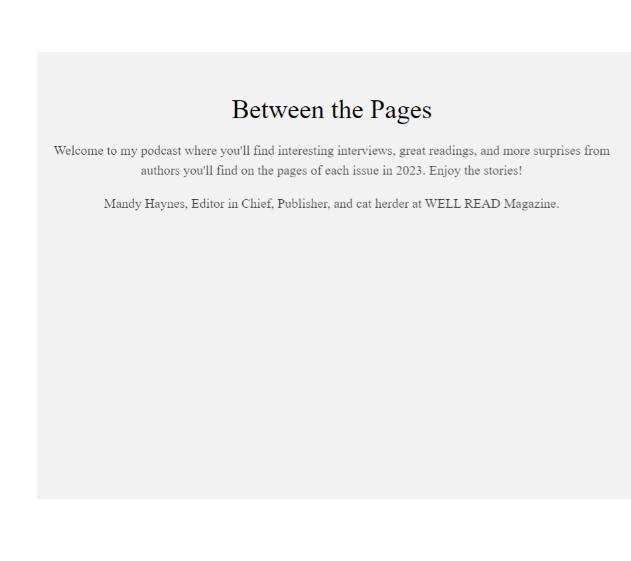
145 JUNE 2024 ISSUE NO. 23

WELL READ MAGAZINE 146 NETWORKING Pat Conroy Literary Center 601 Bladen Street Beaufort, SC 29902 Thursday through Sunday noon-4:00 p.m. Other times available by appointment

147 JUNE 2024 ISSUE NO. 23 NETWORKING


WELL READ MAGAZINE 148 NETWORKING The Haunted Book Shop 9 S. Joachim Street Mobile,Alabama 36602 (251) 348-7668



You come to the city because your passion called you here. Whatever that passion may be. That thing you love. And you wander out into the streets searching for a place to pull up a stool, order a drink, chat with the bartender about all things divine.
Welcome to God On The Rocks. Serving up great drinks and soulful conversations since time began.
149 JUNE 2024 ISSUE NO. 23 NETWORKING





WELL READ MAGAZINE 150 NETWORKING
Authors’ Networking Group




151 JUNE 2024 ISSUE NO. 23 NETWORKING

WELL READ MAGAZINE 152




153 JUNE 2024 ISSUE NO. 23
social
Click here to subscribe to our mailing list and never miss a singe issue! Follow us on
media Visit our online Book Shop and support Independent Bookstores

I’m looking for Authors Interviewing Authors and would love to shine a spotlight on your favorite Independent Bookstores, Book Sellers, Libraries, and Librarians.
WELL READ MAGAZINE 154

155 JUNE 2024 ISSUE NO. 23 These pages are a great way to let readers know who you are and they are FREE. Send orders for ads, interviews, or the stories mentioned above, as well as any questions about the magazine to wellreadmagazine@gmail.com WHAT’SYOURSTORY?


A monthly column that takes us off the page and into the life of
156 WELL READ MAGAZINE
PAGE
Raymond Atkins
OFF THE

It is often noted that old folks don’t like new things, but I don’t necessarily hold with that point of view. I have encountered many new things in my lifetime that I have liked just fine. One example chosen at random is stretch denim. I am a blue jean kind of person, and I have worn them since Eisenhower was president. In the last few years, though, I have been faced with the reality that denim is smaller than it used to be, and every year it just continues to trend towards smallerness. Yes, I know that was not a word, but stay with me: I’m on a roll. I was just this close to having to give up my preferred pants-fabric when stretch denim entered the picture. Now, no matter how small those regular-denim size 44s get, those stretch denim puppies will fit just fine.
So clearly, it is not that I don’t like new things; my issue is with new things I don’t understand.
Of all of the newfangled things I don’t understand, the one that I don’t understand the most is something that is referred to as the cloud.This is an imaginary place up in the sky where all of your important information is just floating around, waiting for some scruffy kid with an internet name such as Buzzsaw or Razorback to come along and grab it for nefarious purposes such as refinancing your house or buying a nice ride in your name. No, you can’t see it up there, although once I thought I saw my Social Security number floating around, but it turned out to be a Chinese
OFFTHEPAGEWITHRAYMONDATKINS 157 JUNE 2024 ISSUE NO. 23
weather balloon. Still, I know you’re going to go look, because I did when I first heard about it, so I’ll wait. Back now? Okay, to continue, I first came across this cloud business when I was in grad school and got stuck on a group project with a couple of guys called Buzzsaw and Razorback. Oh wait. I just made that connection. Anyway, I hate group projects because I am always the one who gets stuck doing all the work, and this was no exception. Buzzsaw and Razorback hung around just long enough to choose the topic of our project—Cloud Computing— before they dropped the course and left me with it. My subsequent paper—What The Hell is The Cloud and Why Do We Even Need The Damn Thing?—was not a big

WELL READ MAGAZINE 158
OFFTHEPAGEWITHRAYMONDATKINS
favorite with my instructor, but it was grammatically correct and had good references, so she gave me a B. Ironically, it is floating around in the cloud right now, so if you would like to claim it for your own, be my guest.
The other new thing I really, really don’t understand is something called crypto currency. It is also called Bitcoin in honor of the very first variety, although there are many more now. I will take a moment to explain it to you, but you are going to have to suspend your disbelief, because it really makes no sense whatsoever. There were these two guys—let’s call them Razorback and Buzzsaw—who invented some imaginary money and hid it out in the cloud somewhere. Yep. The cloud is back. Anyway, they hid a limited amount of this stuff out there, and then they challenged the rest of the internet to go find some. If you found a piece of it, you could then sell it to people who didn’t find it. That’s it. You can’t see it, you can’t take it to the Piggly Wiggly to buy groceries, and even though there seems to be no use for it at all, a piece of this imaginary currency is worth about $60,000.
I began thinking about this whole topic because of the new automatic hand dryer in the men’s room at Sam’s Club. It and I got off to a bad start, and hopefully you will read this before you, too, are humiliated by that infernal machine. It is a next-generation, high-tech marvel, and the first time I saw it, I thought it was for shining shoes. Once
159 JUNE 2024 ISSUE NO. 23
OFFTHEPAGEWITHRAYMONDATKINS
I stuck my foot in there, however, I realized it must have some other function.
Luckily a twelve-year-old kid came in about that time and lined me out on the proper use of the machine. He also helped me get my leg out of the hand dryer, and for a mere $5 he stepped out into the store and brought me back a new pair of shoes. I really only needed the right one, but Sam’s insisted that I take them both. They didn’t get to be who they are by selling just one shoe. Incidentally, I offered to pay the kid in Bitcoin, and he told me that his mama didn’t raise no fool.
If this had been an isolated incident, I wouldn’t be fussing about technology, but everywhere I go, I seem to encounter technology with attitude. It’s a conspiracy, I tell you! As an example, take the self-checkout station at the supermarket where I usually shop. I am embarrassed to admit how many times I’ve been shown up by this electronic demon, and every time it bests me, I swear anew that I will never use it again. But then a situation will arise where I’ll have to run into the store for just one item, and as usual there will be a long line at the lone regular checkout, so once again I’ll get sucked in.
Evil Checkout Machine: Welcome, Shopper. Please slide card.
Me: (Slide card. Scan item. Put item in bag. Tap foot.)
WELL READ MAGAZINE 160
OFFTHEPAGEWITHRAYMONDATKINS
Evil Checkout Machine: Welcome, Shopper. Please slide card.
Me: (Sigh and grumble. Slide card slowly. Scan item carefully. Put item in bag gently. Discontinue foot-tapping.)
Evil Checkout Machine: Please wait for assistance.
Me: (Sigh louder. Retrieve item. Relocate to long line manned by human. Make snide comment.)
Evil Checkout Machine (to neighbor): Foolish human.
In case you are thinking that my technology woes must be solely store or internet related, let me assure you that I have as much if not more difficulty at home. Take my television. I have four remote controls that must be put into play before anything can be watched. Remote control number one turns on the television. Remote control number two activates the cable box for the television, but it also switches on the ceiling fan in the other room. Remote control number three turns off the ceiling fan but sometimes sets off the car alarm in the Nissan parked out in the driveway.And remote control number four turns off the car alarm, but it also ignites the gas log and sometimes switches channels on the television. When it does change the station, by the way, I usually just watch the new channel because by the time I get to this step, whatever I originally wanted to see has gone off.
There is also a fifth remote control that operates my DVD
161 JUNE 2024 ISSUE NO. 23
OFFTHEPAGEWITHRAYMONDATKINS
player, but I’ve given up watching movies completely since I was informed by the FBI that every time I pushed “Play,” the Hubble SpaceTelescope changed orbit.They were quite understanding once they realized I was just attempting to indulge in a little John Wayne fix, but I still think I had best not push my luck, or the “Play” button, again.
Vehicles, too, have acquired the habit of humbling me whenever possible. I drove a friend’s van recently, and it had so many doo-dads and gizmos on it that I felt like an airline pilot. It had all the usual amenities such as cruise control and power steering, but in addition it had proximity sensors, satellite radio, a DVD player, anti lock brakes, fuel monitoring, GPS tracking, back-up video panorama, a heated steering wheel, compression release, remote start, automatic doors, windows, locks, and seats, and a voice.As I sat there, stunned by the array of switches and controls that surrounded me, the van spoke.
Van: May I assist you?
Me: Uh, where do I put the key?
Van: Foolish human…
WELL READ MAGAZINE 162
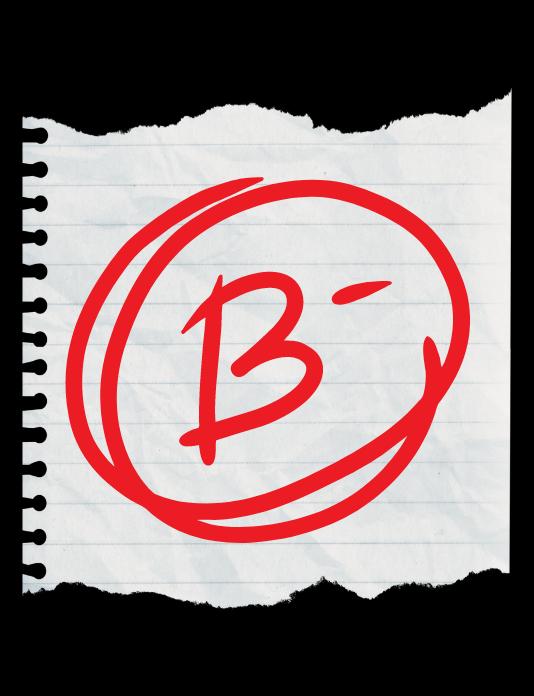
163 JUNE 2024 ISSUE NO. 23
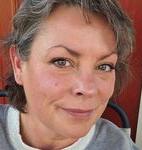
Mandy Haynes, Editor-In-Chief


Mandy Haynes is afreelance writer for Amelia Islander Magazine, Amelia Weddings, author of two short story collections, Walking the Wrong Way Home, Sharp as a Serpent's Tooth Eva and Other Stories, and a novella, Oliver. She is the co-editor of the Southern Writers Reading reunion anthology, The Best of the Shortest. Mandy is the creator, designer, content editor, and publisher of WELL READ Magazine.


Raymond L.Atkins, Contributing Editor (OFF THE PAGE)
Raymond L. Atkins resides in Rome, Georgia, on the banks of the Etowah River in an old house with a patient wife and a lazy cat. His hobbies include people-watching, reading, and watching movies that have no hope of ever achieving credibility. His first novel, The Front Porch Prophet, was published in 2008 and was awarded the Georgia Author of the YearAward for First Novel. Camp Redemption, was awarded the Ferrol Sams Award for Fiction and the 2014 Georgia Author of the Year Award for Fiction. Sweetwater Blues was aTownsend Prize nominee, the 2015 GeorgiaAuthor of theYear runner-up for fiction, and the 2016 selection for One Book, Many Voices. South of the Etowah, his first creative non-fiction book, was released in 2016. It was nominated for a Push-cart Prize and was the 2016 Georgia Author of the Year Award runner-up for essay. In 2017, he was awarded the Lifetime Achievement Award by the Georgia WritersAssociation.


Robert Gwaltney, Contributing Editor (INSIDE VOICES)
Robert Gwaltney, award winning author of southern fiction, is a graduate of Florida State University. He resides inAtlanta Georgia with his partner, where he is an active member of theAtlanta literary community. Robert’s work has appeared in such publications as The Signal Mountain Review and The Dead Mule School of Southern Literature. His debut novel, The Cicada Tree, won the SomersetAward for literary fiction. In 2023, Gwaltney was named Georgia Author of the Year for first novel.

Dean James, Contributing Editor (THE WRITER’S EYE)
Dean James is the USA Today and New York Times bestselling author of the Cat in the Stacks and Southern Ladies mystery series. A seventh generation Mississippian, he lives and writes in the Jackson, Mississippi area with four cats and more books than he can ever count. He keeps his younger sister Carolyn Haines locked in the attic. Despite his best effort she escapes constantly and wreaks havoc on the countryside.
Meet the staff

Dawn Major, Contributing Editor (TRIPLIT with D Major)

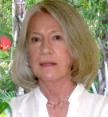
Dawn Major is an associate editor at Southern Literary Review and a graduate of the Etowah Valley Creative Writing MFAProgram. In 2019, she was awarded the Dr. Robert Driscoll Award as well as Reinhardt University’s Faculty Choice Award, both in Excellence in Writing. In 2018, she was a recipient of the James Dickey Review Literary Editor Fellowship. Major is a member of the William GayArchive and has helps edit and publish the late author’s works. She also advocates for southern authors on her blog SouthernRead. She lives inAtlanta, GAwith her family. The Bystanders is Major’s debut novel.


Claire
Hamner
Matturro , Contributing Editor (CLAIRE CONSIDERS)
Claire Hamner Matturro is a former attorney, former university writing instructor, avid reader, and the author of seven novels, including four published by HarperCollins. Her poetry appears in various journals including Slant and Lascaux Review. She is an associate editor ofThe Southern LiteraryReview and lives happily in Florida with her cross-eyed rescued black cat and her husband.


Jeffrey Dale Lofton, Contributing Editor (INSIDE VOICES)
Jeffrey Dale Lofton hails from Warm Springs, Georgia. His years telling the stories of playwrights and scriptwriters as a stage and screen actor taught him the pull of a powerful story arc. Today, he is SeniorAdvisor at the Library of Congress, surrounded by books and people who love them. Red Clay Suzie is his debut novel, a fictionalized memoir written through his lens—gay and living with a disability— in a conservative family in the Deep South. It was longlisted for the 2023 Center for Fiction First Novel Prize and awarded the Seven Hills Literary Prize for Fiction, among other distinctions.

Annie
McDonnell,
Contributing Editor (ANNIEASKS)
Annie McDonnell, best selling author of Annie’s Song: Dandelions, Dreams & Dogs, contributor to In Flow Magazine, NZ and founder of the Write Review, teacher, speaker, book reviewer, author consultant, co-administrator of the World of the Write Review Book Club, blogger, and author online event planner.
Eva by Mandy Haynes
“Behold, you give unto me the power to tread on serpents, and over all the power of the enemy, and nothing shall by any means hurt me…”
Meet Eva, a young daughter of traveling Pentecostal preachers, who catches snakes while her parents hide behind the bible and a large wooden crate. Eva’s life changes when she makes her first friend and realizes there is more to life than fear.
…When it was time to for me to go home, Eva pointed at my bucket and asked, “What are you goin’ to do with them things anyway?”
“Daddy uses them for fishing bait.”
“You reckon he’ll need more tomorrow?” She asked.
“Oh, no…these’ll last him awhile!” We’d filled the bucket almost full and I couldn’t wait to show him. I’d never caught that many before, not even with Hank. I laughed, tickled with myself, but noticed Eva was frowning.
“Oh, I was hopin’we could catch some more tomorrow.”
Before I could talk myself out of it, I turned the bucket upside down and let the crawdads loose.As I watched them run backwards for new hiding places, I fought the urge to grab them back. But I wasn’t sure Eva would want to meet me without
having a reason, or if she would talk like she did without having the crawdads to keep her busy.
“What did you do that for?”
“I guess I’ll see you here tomorrow.” I said with a shrug and broke out in giggles while Eva stared at me like I’d sprouted a second nose, or another set of ears. I couldn’t stop giggling, but Eva never even smiled.
“Alrighty then,” she finally answered and we made our way out of the creek.
“Right here, tomorrow?” I called out to Eva.
I held my breath until she nodded. Then we smiled at each other on the opposite sides of the creek.
Me with my empty bucket, and Eva with a sack full of snakes. “You’ve got to meet Eva! Every character Mandy Haynes writes is seductive and complex. Young Eva entices you with her wisdom and fearlessness. Read this story and then buy the whole short story collection Sharp as a Serpent’s Tooth. You won’t be able to put it down.” Ruthi Landis, Best Selling Author, Life Coach/ Therapist, Enneagram Teacher
Eva is a novella that’s in the collection, Sharp as a Serpent’s Tooth - Eva and Other Stories. If you want to hear the rest of Eva’s story, you can read it now for free through Kindle Unlimited, or purchase it for ninety-nine cents.


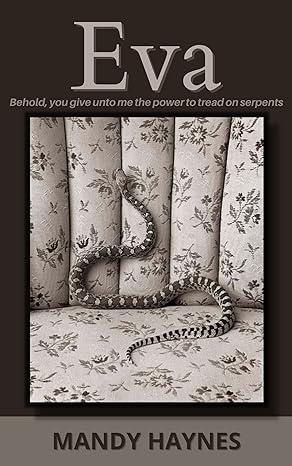































 Oliver by Mandy Haynes
Oliver by Mandy Haynes











































































































